Does faith beget violence?
It’s a perception, to be sure, and a widespread one too. But Perth Priest Fr Sean Fernandez says historical myths have obscured the wider, truer, picture. - VISTA 1


It’s a perception, to be sure, and a widespread one too. But Perth Priest Fr Sean Fernandez says historical myths have obscured the wider, truer, picture. - VISTA 1

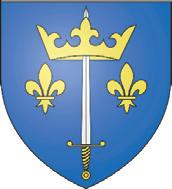




ARCHBISHOP Barry Hickey has written to Australian Foreign Affairs Minister Stephen Smith asking him to urgently investigate the apparent kidnapping of approximately 50 Karen children from an orphanage near the Thai-Burma border for trafficking purposes.
“I understand that Mrs Adelia Bernard of the One Heart Association has alerted your office to the abduction of 50 Karen children from an orphanage near the Myanmar border in Thailand during the night of 28 December 2009,” the Archbishop said in his letter, dated Tuesday, 18 February.
“The Thai authorities have been informed but to date they have not located the missing children.
“The fear is that they have been abducted for child trafficking. Their ages range from 11 to 14, male and female.
“The supporters of the orphanage here in Perth include the One Heart Association and the Presentation Sisters, Sr Cecilia and Sr Consuela in particular.
“I respectfully ask you to take whatever steps you can to discover the fate of these children and the people responsible for their disappearance. The matter is urgent.”
Archbishop Barry Hickey issued the following statement last weekend regarding Fr Richard Abourjaily:
“Fr Richard Abourjaily is a priest of the Sydney Diocese currently without priestly faculties.
“On the recommendation of Fr John Flader of Sydney, I met Fr Abourjaily some weeks ago regarding the possibility of him taking up priestly ministry in Perth.
“I allowed him to reside in a Perth parish and gave him permission to help out if needed while I contacted Cardinal Pell.
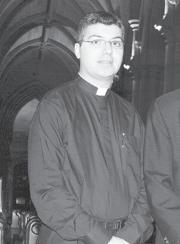
“Following my conversation with the Cardinal, I thought it best to recall Fr Richard from the parish and arranged for him to live privately with two other priests. Fr Richard does not have Perth faculties and therefore cannot do any public ministry until further notice.
“Fr Abourjaily will use this time to take stock and discern his future. I do not feel I can comment in any way on events that occurred in the Sydney Archdiocese.
“Be indefatigable in your purpose and with undaunted spirit resist iniquity and try to conquer evil with good, having before your eyes the reward of those who combat for Christ.”
-Bishop Matthew Gibney 1874For 10 years Michael Sandrini was a bikie who got caught up in drugs charges, a firearms offence, owned an assault rifle and went to jail. But since 2003 he’s been teaching Perth youth about God and the Catholic Church. Here’s the conversion story he gave Debbie Warrier.
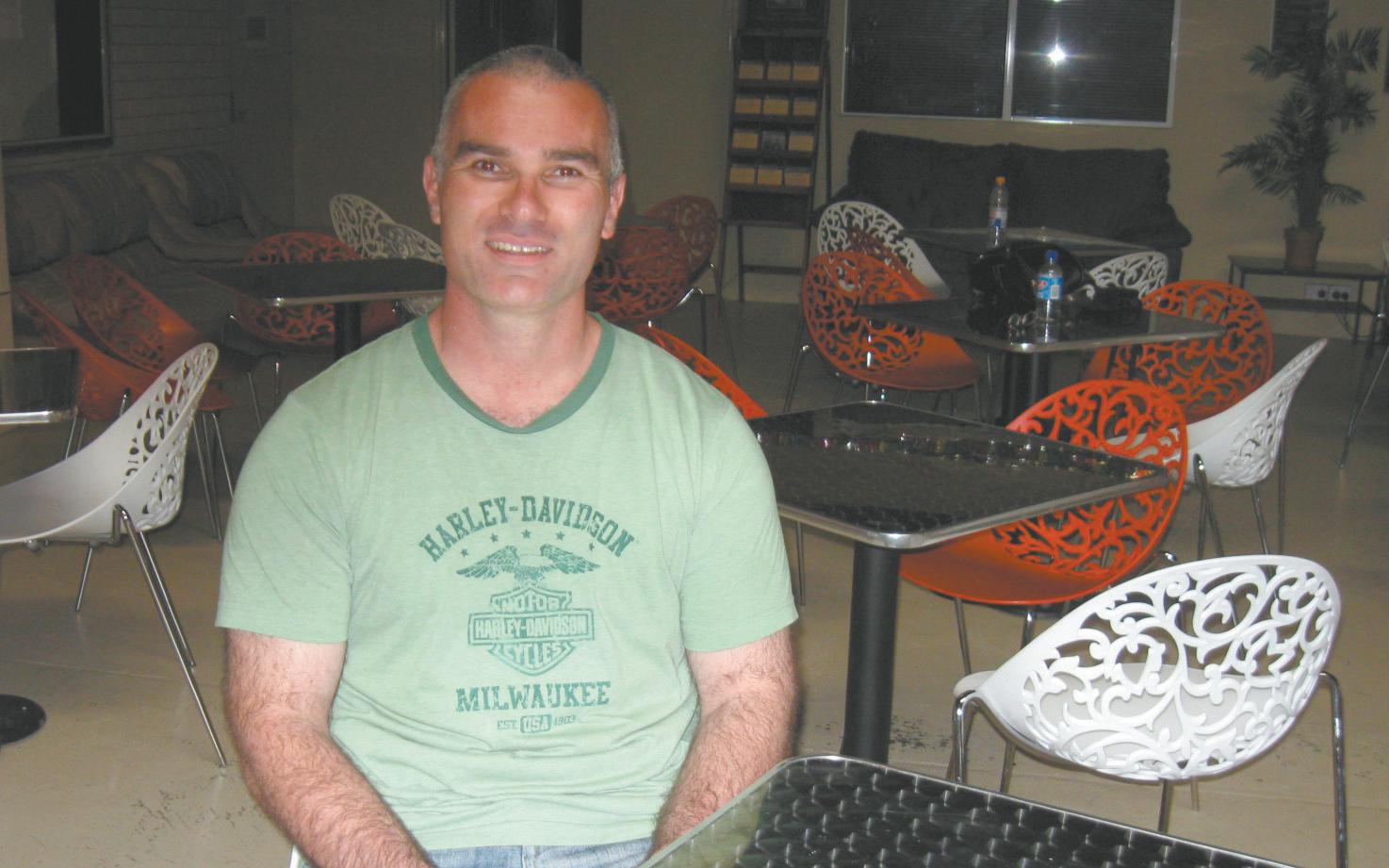
AS TOLD TO DEBBIE WARRIER
Record Writer
Prayer is lifting our hearts up to God. It is something I never stop doing. As a family we do the Rosary, the Divine Mercy Chaplet, Chaplet of St Michael and Grace. My wife and I do the daily readings from the Missal and watch EWTN. Our children are young but it’s about creating a Catholic culture.
I see the day as an opportunity to be united with Jesus. I go to daily Mass and Adoration. One of the blessings about working in the Disciples of Jesus Covenant Community Youth Ministry is that we have a Chapel on site. At night I do spiritual reading and fall asleep saying Our Fathers, Hail Marys and Glory

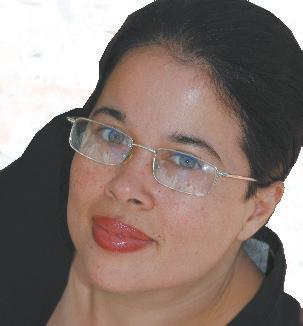 with Debbie Warrier
with Debbie Warrier
bes. I aim to have weekly confession and monthly spiritual direction. I am very blessed to be guided and inspired by Fr Doug Harris and Fr Brian Morgan.
My role as 24:7 Youth Minister allows me to introduce teenagers to God’s love. They have self worth, dignity, a reason for being and are special. We pray to the Lord to help us build faith relationships
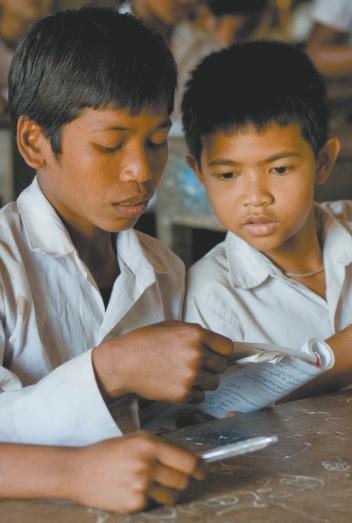
and friendships between those young people. We offer them love, acceptance and hope. Otherwise they might drift into a life of pain like mine was.
I was an associate of a motor cycle gang when there was a gang war going on between two rival clubs. I was lucky not to end up dead or to do something that would lead to a long jail sentence, but I got caught up with some drug charges and a firearms offence. I had my own assault rifle. I had hatred, bitterness, jealousy and worldly competition within me. Deep down I was a good person but just went AWOL.
Whilst in jail I received letters from my best mate at school, Romano Sala Tenna which read: “Mick, you’re a better man than that.” He wasn’t afraid to speak the Please turn to Page 9
Western Australia’s award-winning Catholic newspaper since 1874 - Wednesday, 17 February 2010 Perth, Western Australia $2 www.therecord.com.au
The list of previous clergy who have served in the Parish of St Columba in South Perth is long, but all were recalled and prayed for by students from St Columba’s Primary School last Wednesday, 10 February.
The touching moment came during a special Mass for the Year for Priests organised by the Parish Council and concelebrated by Parish Priest Fr Michael Casey as principal celebrant, together with Perth Vicar General, Monsignor Brian O’Loughlin, who also resides in the Parish, and Monsignor John O’Shea.
Although never appointed to the Parish, Monsignor O’Shea has previously stepped in on a number of occasions to relieve while Fr Casey was away on leave.
Video
The Parish
Podcasts The Nation
Print The World
Try the CNS Mediaplayer on The Record’s website www.therecord.com.au
Fr Casey took time to welcome Monsignor O’Shea, pointing out the “Monsignor was discharged from St John of God Hospital this afternoon, yet he is here to concelebrate this Mass”.
Students prayed for present and past parish clergy, while an illustrated booklet prepared for the Mass by the school administration was later described by Monsignor O’Loughlin as “beautiful.”
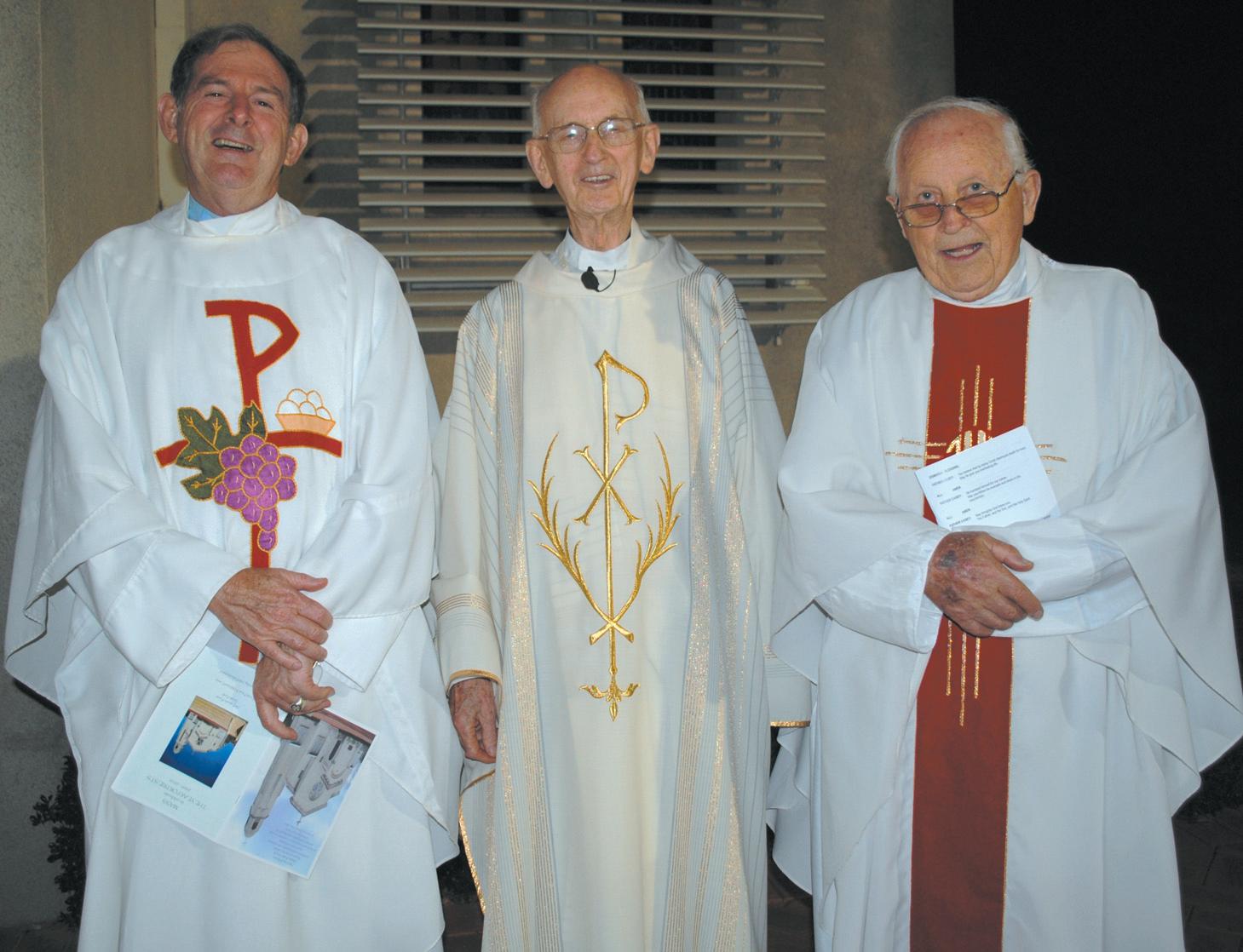


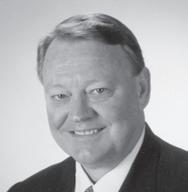
Local
Robert
Mark
National
Anthony
Advertising/Production
Justine
Accounts
Classifieds/Panoramas/Subscriptions
Bibiana Kwaramba administration@therecord.com.au
Record Bookshop
Caroline Radelic bookshop@therecord.com.au
Proofreaders
Christine Jaques Eugen Mattes
Contributors
Debbie Warrier
Karen and Derek Boylen John Heard
Anthony Paganoni CS Christopher West
Catherine Parish Bronia Karniewicz
Fr John Flader Guy Crouchback
The Record PO Box 75
Leederville WA 6902
587 Newcastle Street, West Perth
Tel: (08) 9227 7080, Fax: (08) 9227
Website:
The
The
Fr Casey, meanwhile, was thanked by Parish Council Chair Mrs Pat Brown for his 40 years of service as parish priest and congratulated on his recent award of the papal honour known as the Croce Pro Ecclesia et Pontifice (Cross for the Pontiff and the Church) medal and accompanying scroll.
While the occasion focused on the Year for Priests, it also dipped into the history of the parish and its clergy.
Mrs Brown read a list of those who had served as parish priests beginning with Fr Pace in 1918.
It was Fr Pace who, while stationed at the original St Mary’s Cathedral built
Popular Perth Parish Priest
Monsignor Sean O’Shea suffered a mild stroke on February 10 but was discharged from hospital the same day.
Despite the stroke, which occurred while he was on Rottnest Island where he resides as chaplain, he was able to be at St Columba’s Parish in South Perth on time to concelebrate a Mass for the Year for Priests. He was fortunate that both a nurse and a doctor were close at hand to assess him and arrange for him to be taken to St John of God Hospital in Subiaco.
Perth Vicar General Monignor
Brian O’Loughlin told The Record the only sign of the event was the occasional lack of use of Monignor O’Shea’s right hand.
At supper after the South Perth Mass he was open with those in attendance about his medical adventure earlier in the day.
Clergy of the archdiocese were informed at a meeting of priests on Thirsday 11 February.
Monsignor O’She was recuperating at a residence for retired priests last week
by Bishop Martin Griver, had received the Goody family, including young son Launcelot, into the Catholic Church.
Launcelot Goody was to become the first Auxiliary Bishop in Perth from 1951 to 1954, first Bishop of Bunbury from 1954 to 1968 and third Archbishop of Perth, serving from 1968 to 1983.
The third parish priest, Monsignor JT McMahon, served the parish for a record 47 years from 1932. It was Monsignor McMahon who built the beautiful and well-known landmark church overlooking the Swan River and Perth.
The Mass was a community celebration. The Julian Singers led the singing while students from St Columba’s School served Mass and read the Prayers of the Faithful. Included in the booklet prepared by the school was Archbishop Barry Hickey’s Prayer for the Year for Priests. Parishioners Harrold Walsh and sacristan Mary Haydock presented the Offertory gifts.
Mrs Brown thanked the Julian Singers, acknowledging that surviving assistant priests, all of whom are elderly, had been
Parish Priests
Fr Pace 1918-1925
Dean Brennan 1925-1932
Monsignor JT McMahon 1932-1979
Fr Michael Casey 1979-present
Assistant clergy
Fr Charles Cunningham (Administrator)
1935-1936
Fr Alan Johnston (Administrator)
Fr B Harrington 1938
Fr Pat Carmody 1938-1941
Fr J Murphy 1941-1943

invited but had declined for reasons of health. Following Mass, a reception in the school undercover area gave present and past parishioners the chance to socialise and to congratulate Fr Casey for his long and distinguished service.
Fr G O’Leary, 1943-1946
Fr D Lenihan, 1946-1950
Fr Hubert Kelly, 1949-1951 (retired, SJOG Villa, Subiaco)
Fr W Buckley 1951-1954 and 1960-1963
Fr Michael Byrne 1954-1956
Fr John Challis 1956-1958
Fr John Chauncey 1958-1959
Fr J Dowling, 1959-1960
Fr Henry Byrne, 1963-1964
Fr Brian Harris, 1964-1967 (now PP East Victoria Park)
Fr Ken Keating, 1967-1969
Fr Pat Turner, 1970-1974 (retired, now Chaplain at SJOG Villa, Subiaco)
Fr Mathias, 1976
Fr Mirko Maslovar (Administrator) 1974-1976
Fr Jim Foley, 1976-1979
25 Premier’s Launch of Caritas Australia’s Project CompassionArchbishop Hickey
Rite of Election, St Mary’s Cathedral - Bishop Sproxton
28 Annual Fruit Harvest Festival Procession and Mass, Pickering Brook - Archbishop Hickey
March
1/2 ACBC Permanent Committee, Sydney - Archbishop Hickey
VG
2010 Scouts Australia Founder’s Day Service - Fr Dat Vuong
24 YouthCARE Meeting and Dinner- Bishop Sproxton
3 Towards Healing Seminar - Bishop Sproxton, Mgr Brian O’Loughlin VG
4 Installation of Most Rev Anthony Fisher OP, ParramattaArchbishop Hickey
With Ash Wednesday, the Season of Lent begins. It lasts for 40 days (excluding Sundays) until Holy Saturday.
It recalls the 40 days that Jesus spent in the desert before He began his public ministry. It recalls also the 40 days that Moses spent on Mt Sinai when he was given the Ten Commandments, and the 40 years the Israelites spent in the desert under Moses on their journey to the Promised Land.
With all these scriptural links, Lent is connected with Jesus’ own penitential preparation for His public ministry. Today, penance helps us prepare for Easter, the commemoration of Jesus rising
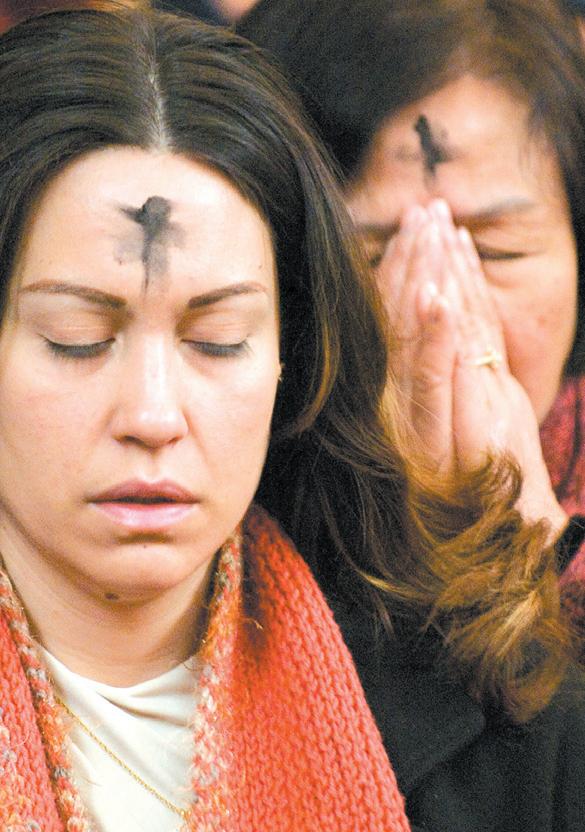
from the dead, victorious over sin and death.
Oddly enough, Lent is welcomed by Catholic people despite its call to penance. Most see Lent as an opportunity to recapture the ideals of the Christian life which can easily be forgotten today.
Lent is a time of personal spiritual renewal. It is a time of restraint, a time of prayer and reflection to re-order one’s priorities, and to make changes that will place God first in our lives.
Jesus called for penance. He asked us to take up our cross daily and follow Him. He asked us to accept the reality of suffering, especially in the cause of right, assuring us that if we follow Him we will find that our burdens are light. Given the call of Jesus to walk in His way, let us then take this season of great grace seriously.
The Church asks three things of us in Lent - prayer, penance and almsgiving.
Prayer We must ask ourselves, then, if we truly pray, or, if we have neglected prayer, build it into our lives again. We can pray at home, each morning and evening. We can open our Bible for a few minutes and let it turn our hearts to prayer. Our Masses can be full of distraction. We might concentrate a little more to pray the Mass, enter into the mysteries of Jesus’ death and resurrection with thanksgiving and praise.
Penance We need not only obey the rather easy requirements of the Church about penance but develop a spirit of penance, accepting burdens laid on us with patience and trust and seek ways of changing those habits that injure us spiritu-

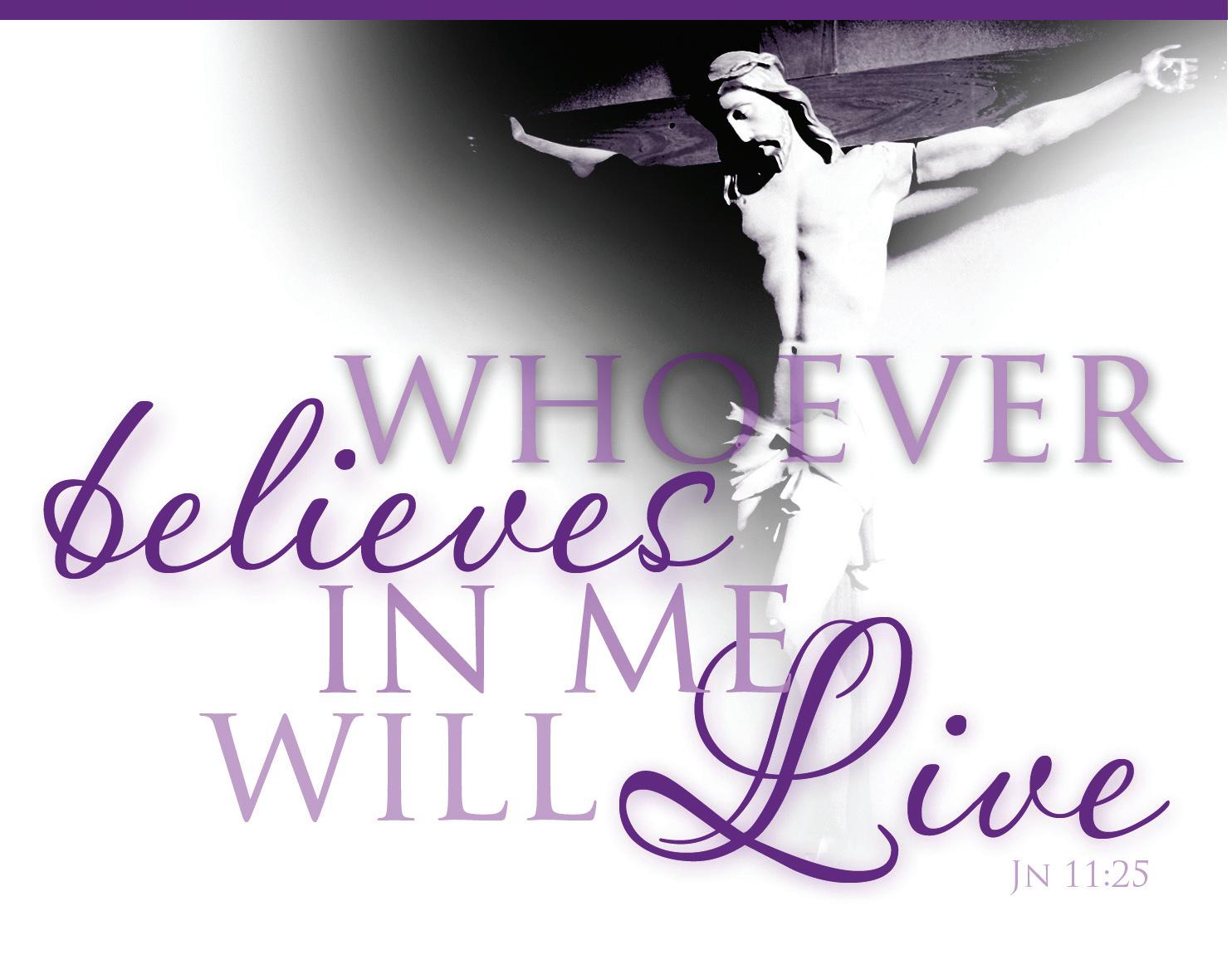
ally, like selfishness, spite, criticism of others and arrogance.
Almsgiving Personal generosity is a beautiful Christian virtue. Giving to others, especially the poor, not only helps in their need but purifies us from attachment
to possessions as they can never satisfy our spiritual needs.
In his letter to us at this time of Lent, the Holy Father, Pope Benedict, speaks of the need for personal renewal.
I quote: “Conversion to Christ,
believing in the Gospel, ultimately means this: to exit the illusion of self-sufficiency in order to discover and accept one’s own need - the need of others and God, the need of His forgiveness and His friendship.”
Let us seek to restore our true relationship with God this Lent by being obedient to the prompting of the Holy Spirit.
May the prayers of Mary, Mother of our Saviour, accompany us on our Lenten journey.
+B
J HickeyNOTE: Ash Wednesday and Good Friday are days of fasting and abstinence.
The Church’s laws on fasting bind all aged 18 and over through to those beginning their 60th year. The Church calls the faithful to determine for themselves what is appropriate to give up during Lent. The Church’s laws on abstinence asks those who have completed their 14th year and older to refrain from the consumption of meat on Fridays and Ash Wednesday.



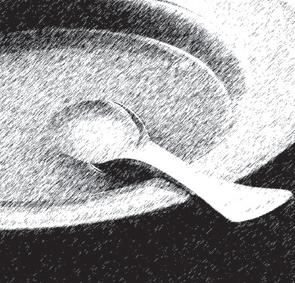





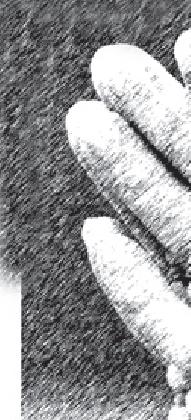



Is
Is it true I regularly publish testimonial letters from satisfied customers praising us for our outstanding level of customer service?
Is it true that although I spend a lot on advertising, most of my sales are from a combination of personal recommendation, repeat business and reputation?
Is it true that for seven consecutive years I was the world’s top selling Hyundai dealer?


Is it true I have been doing business in Victoria Park for over 40 years?
Is it true I sell on average over 1600 vehicles every month, which is the highest in Australia from one location.
The reformation of music in the Mass will echo that of the liturgical texts they proclaim – to preserve and recover the riches of the Church. The tradition of unaccompanied singing in the Roman Rite will also be reclaimed. Anthony Barich reports.
MUSIC for the newly translated Roman Missal to hit Australian parishes next Easter, including the use of traditional chant, will correct Australian habits developed since Vatican II that the Council did not call for and enrich the faithful, liturgists were told at a conference in Perth earlier this month.
Most of the texts recited or sung by the priest celebrant will change, and new musical settings will be provided in the Sacramentary (Missal) based on traditional chant formulae.
“In this way, what may seem new will have a sense of continuity with the past”, said the Archdiocese of Adelaide’s liturgy co-ordinator Jenny O’Brien, addressing a workshop at the 4-7 February Australian Bishops’ Liturgy Commission
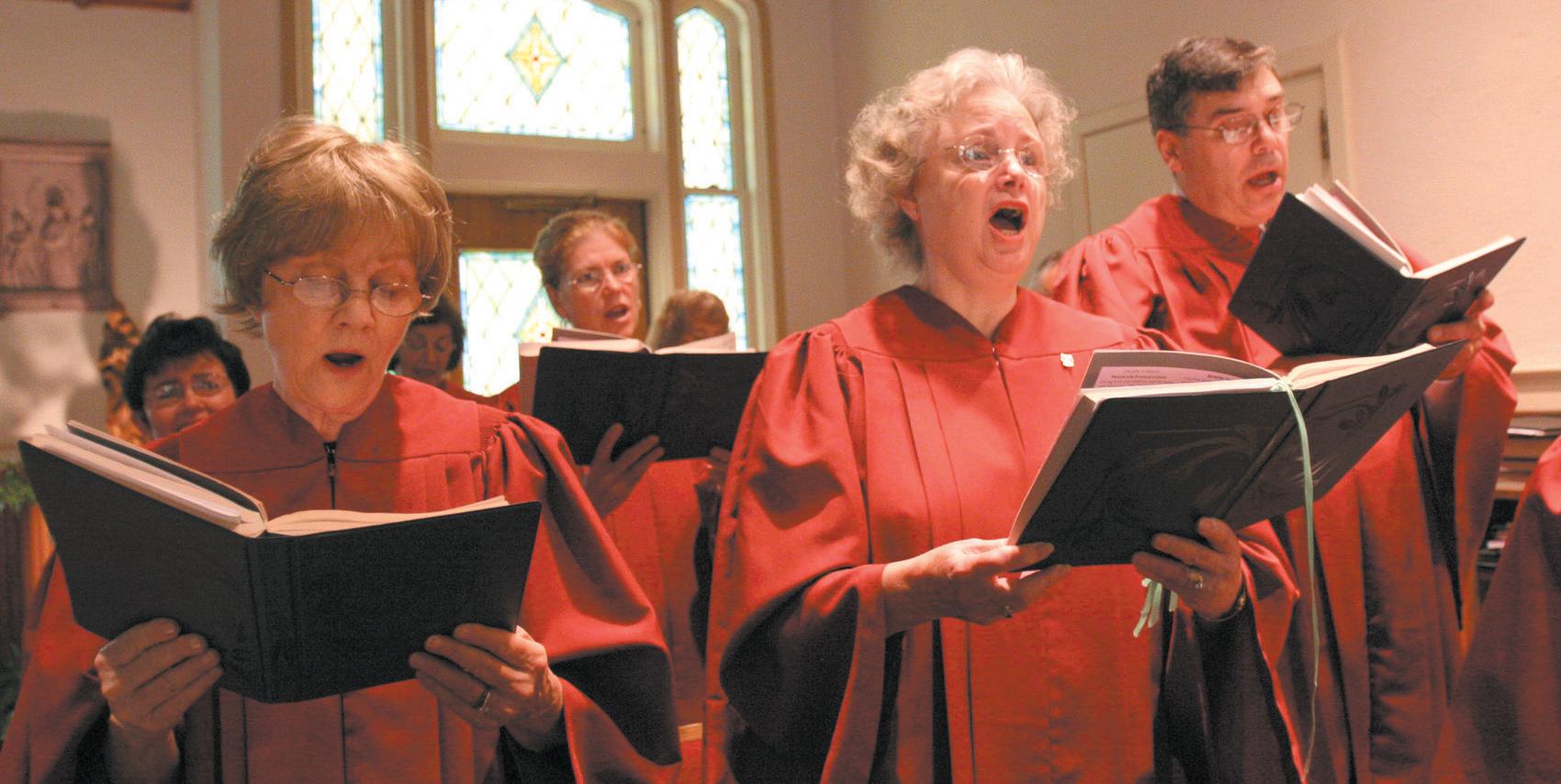
national conference. Using a presentation based on a draft paper prepared by International Commission on English in the Liturgy (ICEL) Music Committee member Geoffrey Cox and a workshop on Music in the Liturgy given in July 2009 by Mrs O’Brien, she told the 4-7 February conference that the use of singing will also assist the new texts to become assimilated more easily.
She added that while pastoral judgement of songs must take into consideration the age, culture, language and education of the assembly, “so must the ability of all people to learn something new and to understand things that are properly and thoroughly intro-

duced”. There is also no direct call in the General Instruction of the Roman Missal (GIRM) or any of the Church’s official liturgical documents, for a recessional song, “even though this is customary in Australia”, Mrs O’Brien said.
“Since the assembly is dismissed to go forth and proclaim to the world what they have just celebrated, if a hymn is used here it is appropriate that it either have the sense of sending the people out to discipleship or reinforce the liturgical season or theme of the day’s readings,” she added.
Other extrapolations on music and the liturgy itself include the very use of the vernacular. Archbishop Mark Coleridge, chair
St Clare’s is a small secondary school founded by the Good Shepherd Sisters in 1956. The school caters for approximately thirty adolescent girls who require different learning pathways due to many factors that have impacted upon, or limited their educational experiences.
The school staff work together to create a structured and supportive environment for the students to experience appropriate learning opportunities.
Strong emphasis is placed on:
• Individualised education programs
• Individualised career pathway plans for senior students
• Developing self esteem, assertiveness, social skills, communication skills, personal responsibility and gospel values
Applicants with leadership experience in primary education as well as secondary education will also be considered.
St Mary’s is a co-educational Catholic primary school catering for approximately 75 students from Kindergarten to Year 7. A strong sense of community has been nurtured since the school’s inception by the Presentation Sisters in 1957 and this is clearly evident today. Boyup Brook is located within the Blackwood Valley region, 123kms from Bunbury and some 270 kms from Perth. This welcoming town is surrounded by rolling pastures, tall forests and farming districts.
St Mary’s offers a diverse and engaging curriculum. A myriad of learning and sporting opport-unities in a safe, welcoming and supportive environment develops within our students a love of learning and encourages them to see learning as a lifelong process.
The school has been implementing RAISe (Raising Achievement in Schools) since 2007 and has a strong emphasis on early intervention. St Mary’s has fully embraced ICT throughout the whole curriculum, PATHS (Promoting Alternative Thinking Strategies), Primary Science Connections, the arts (visual art, music and instrumental music), LOTE (French) as well as an extensive physical education program.
St Mary’s is highly regarded within the Boyup Brook community and surrounding district due to its vibrant and committed staff and tremendously supportive and active P&F together with a proactive and visionary School Board. The school has a close and collaborative relationship with the parish and enjoys strong pastoral support from the parish priest. Together, this helps to create a family-centred school where the students are led through an integration of faith, life and learning.
The successful applicants will be expected to take up these positions from the commencement of Term 2, 2010.
Applicants need to be practising Catholics and experienced educators committed to the objectives and ethos of Catholic education. They will have the requisite theological, educational, pastoral and administrative competencies, together with an appropriate four year minimum tertiary qualification, and will
The
– will also assist in areas where there are people of diverse cultures and language groups.
She said that the continuing use of some Latin texts in a predominantly English-language liturgy should not be considered “unusual” or “retrogressive”.
Whenever a liturgical text is sung, it should be the exact text or as close as possible to it. Paraphrases are generally not acceptable, she said. For example, the GIRM insists that the text of the Gloria must not be replaced by any other text. The same principle, Mrs O’Brien said, applies to all the liturgical texts.
of the Australian Bishops’ Liturgy Commission and of ICEL’s Roman Missal Editorial Committee, said at the conference that Vatican II never explicitly mandated the entire Mass be in the vernacular, “yet that’s what we got”.
Mrs O’Brien added that Church documents since Vatican II have recommended that at least some parts of the Mass, such as the Pater noster (Our Father) and the Credo (Nicene Creed) be retained in Latin even where the liturgy is otherwise celebrated in the vernacular. The continuing use of Latin, such as in the Kyrie - which, along with the Our Father and the Lamb of God, is the only text in the newly translated Missal to remain untouched
The highest priority for singing at Mass should be given to dialogues between celebrant and people; the Gospel Acclamation and acclamations during the Eucharistic Prayer including the Holy holy, Acclamation of faith and the Great Amen; the Responsorial Psalm and the processional chants/hymns. The Kyrie, Gloria and Agnus Dei may also be sung, along with the Creed and the Lord’s Prayer. The GIRM says that the Creed is to be sung or said by the priest with the people on Sundays and Solemnities. The new Sacramentary provides the option to use either the Nicene Creed or the Apostles Creed, which is an abbreviated version.
Mrs O’Brien also stressed that singing all parts of the Mass setting alone and singing four or five hymns at the Mass without any other music does not reflect the proper structure of the Mass.
The 11 February passing of Queensland legislation which, among other things, will enable two men, two women or a single person to “order” a baby via surrogacy, is a blight on the State and will have ramifications on sections of all future generations of Queenslanders, the Australian Christian Lobby (ACL) said.
ACL managing director Jim Wallace said the Queensland Government had displayed a distinct lack of moral courage in bowing to the political agenda of the gay and lesbian rights lobby to obtain children and had blatantly disregarded the most basic rights of children to at least begin life with both a mother and a father.
“Each MP who voted for the Queensland Surrogacy Bill has failed to meet their most sacred duty to uphold the best interests of the child,” Mr Wallace said.
Commonwealth funding for a new post-acute community care package could quickly and simply ease pressure on public hospital ‘bed block’, Catholic Health Australia has proposed.
Creating such a package would free up the approximately 3,000 public hospital beds which at any one time are occupied by people who would be more appropriately cared for by specialty aged care providers, CHA said.
The measure would also broaden the number of aged care places available.
Catholic Health Australia has warned the Federal Government that people living in residential aged care could suffer reduced standards of care if it goes ahead with its planned Emissions Trading Scheme (ETS). CHA told The Weekend Australian that its member aged care operators would face an additional cost of around $10 million a year if the ETS went ahead as planned.
Climate Change Minister Penny Wong earlier gave CHA an indication that the Government was sympathetic to the aged care operators’ situation.
THE reform of music in the newly translated Roman Missal to hit parishes by Easter 2011 will prompt Catholic Education Offices and people writing and choosing music for children’s Masses to “lift their game”, the director of the Australian Bishops’ National Liturgical Office said.
Fr Peter Williams told The Record last week that Catholic Education Offices around Australia have too often adopted works of familiar artists without proper scrutiny of musical and theological value, resulting in children not fully understanding the mysteries of the Mass.
“Much music has been written for music in schools; and while some is fine, much of it is poor, and the texts employed are really somewhat trite and banal - you get texts that get the kids singing “we’re happy to be gathered here, thank you God for being here” … they really don’t say anything,” Fr Williams said.
“You’re dealing with a whole bunch of jingles which are problematic and are not leading the children into anything. We’re not saying they should be singing complex theological texts but we can do a lot better than what we’ve used in celebrations in schools, and a lot of it is really very poor.”
He added, however, that he does not blame teachers, as “those who write for children, or say they do, have done so for a long time, and their music is well known and they will present to Catholic Education Offices their latest offerings, but there’s not a serious critique going on”.
“People are just happy to say ‘here’s the latest by him or her, it must be good so let’s put it out there’, but nobody’s critically assessing whether the music or the texts have any real substance to them,” he said.
While admitting that it is a fine
balance between making music accessible to children and keeping it theologically sound, “there’s a lot (of music) there that we could jettison”.
A subcommittee of the National Liturgical Music Board is currently conducting a review of hundreds of texts of children’s music, expected to be completed by the end of this year – “an exhaustive exercise that must be done carefully, with a view to establishing certain criteria”.
He stressed that in this review process, “we’re not after people; it’s not a campaign. We’re attempting to help those who do work in that sector to lift their game, and we’ve already had productive meetings with people who work in that sector, and they understand that there is a need to reappraise”.
Fr Williams’ comments echo those made in a presentation at the 4-7 February national liturgical conference in Perth by Jenny O’Brien, liturgy coordinator for the Archdiocese of Adelaide, who said that liturgical, musical and pastoral judgement must be considered when choosing hymns.
In doing so, she said, texts of hymns must always support the liturgical text and convey meaning faithful to Church teaching. “Many songs written ‘for children’ fail in this regard,” she said.
“Over recent years quite a significant body of music has been published which purports to be ‘liturgical music for children’.”
“While some of this is indeed very good”, she added that “much of it is also very poor from both a musical and a theological perspective, and does not lead the children deeper into the mystery being celebrated or to full, conscious and active participation” as Vatican II said it should. “We insult both the liturgy and the children when we use inappropriate music just because it is ‘catchy’ or ‘easy to sing’,” Mrs O’Brien said.
She suggested that parishes and



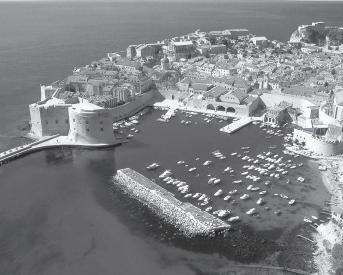
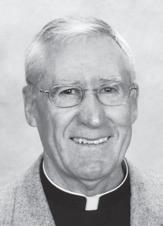
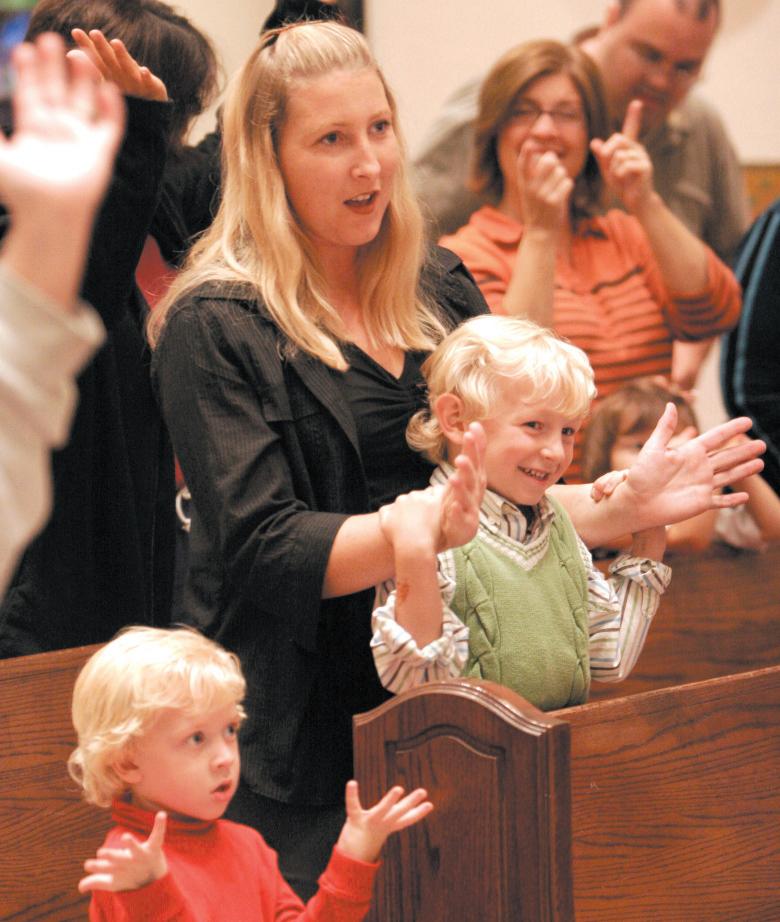
schools have a “shared repertoire” so the parish can regularly include in its Sunday liturgies music that is sung for school or class Masses, and vice versa.
She also warned against the use of tunes used in pop culture for the sake of appeal, which runs the risk of losing the sense of the sacred.
Mrs O’Brien said that while personal taste is a factor in musical judgement, it should be made by “competent musicians, since to admit to the Liturgy the cheap, the trite or the musical cliché often found in secular popular songs is to cheapen the Liturgy, to expose

it to ridicule and to invite failure”.
Debra Sayce, WA Catholic Education’s director of Religious Education, said that the new translation of the Roman Missal would give schools an opportunity to reinvigorate liturgical practices and deepen the staff, students’ and parents’ understanding of liturgy.
“To cite (the Australian Bishops’ Liturgy Commission chair) Archbishop Mark Coleridge, this ‘new translation will give new energy for mission that will lead to new evangelisation’. We in Catholic education look forward to being part of this process,” she said.



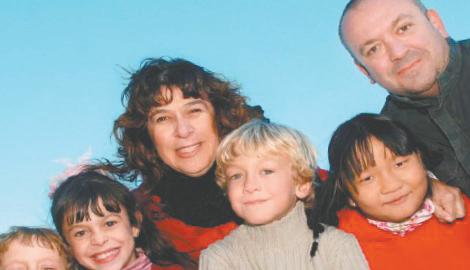
Brennan
IN an unprecedented move, respected human rights advocate Fr Frank Brennan has been appointed an official advocate for four of Australia’s leading health, social services, aged care and education bodies.
As Catholic Advocate in Residence for the St Vincent de Paul Society, Catholic Health Australia (CHA), Catholic Social Services Australia (CSSA), and the Australian Catholic University’s Public Policy Institute (PPI), Fr Brennan will endeavour to raise awareness and drive change on the health and welfare of disadvantaged Australians.
In appointing Fr Brennan, the St Vincent de Paul Society, CHA, CSSA and the PPI have signed a Memorandum of Understanding, committing to work together to improve the lives of people who are disadvantaged and marginalised by addressing issues that undermine their health and welfare.
Fr Brennan spoke on The Church as Advocate in the Public Square: Lessons from the National Human Rights Consultation at Old Parliament House on 8 February at the CSSA national conference in Canberra.


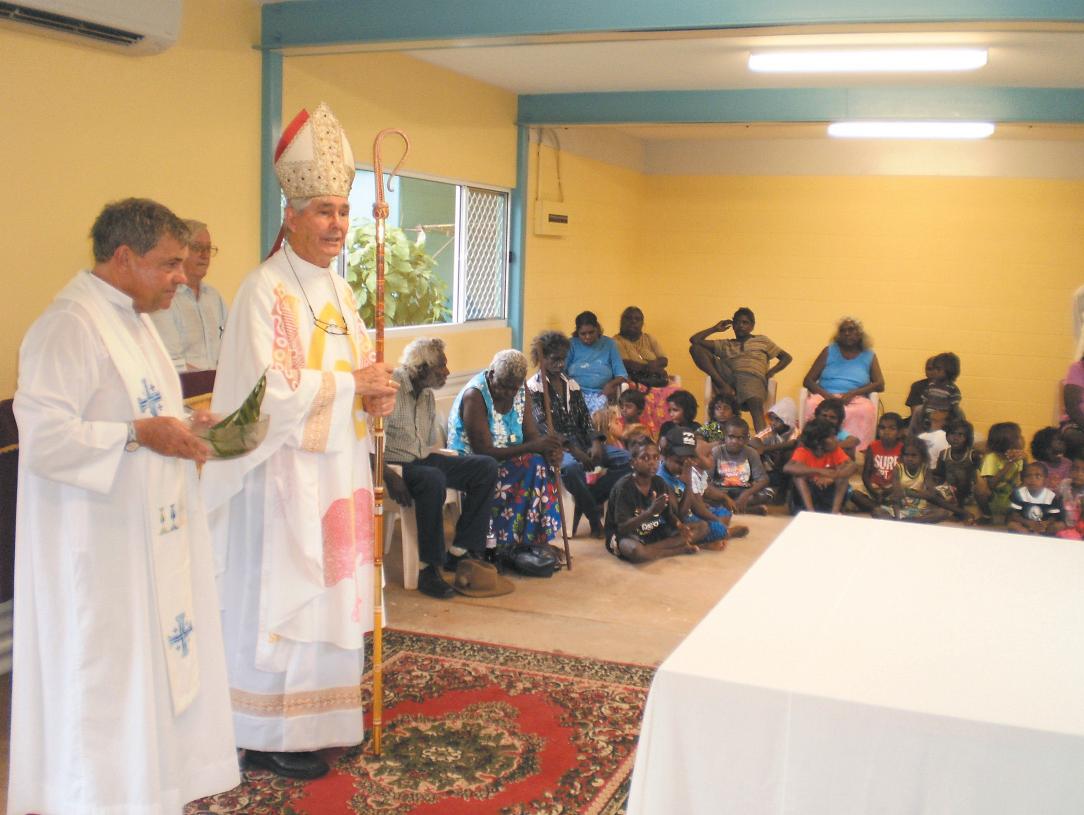
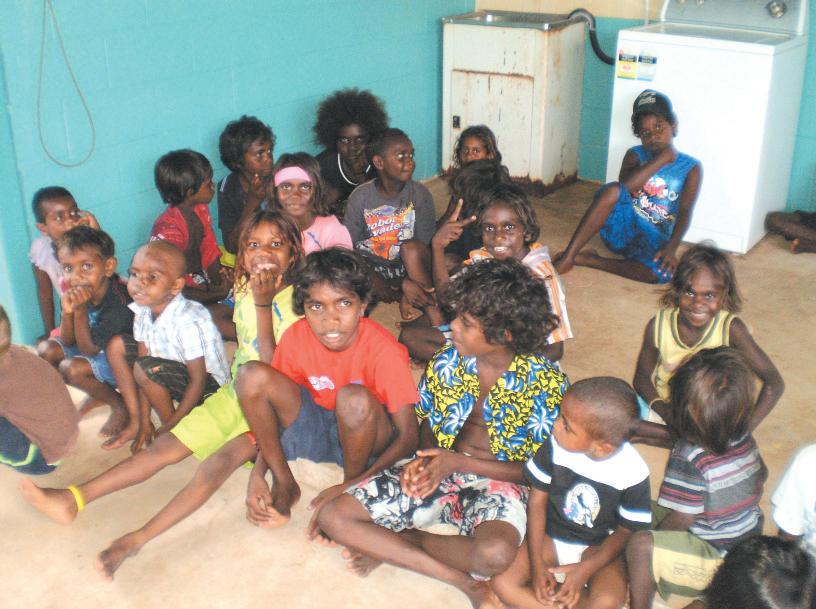
Some of the many local children who were present for the blessing of the new John Paul II meeting room on 6 January. Within the community, up to 10 Aboriginal languages are spoken. Six of them can be read saying ‘Welcome to our School’ at the entrance to the parish school.
Perth doctoral student Marco Ceccarelli currently works for the Church in Daly River and sent this report of life in a remote Northern Territory parish
As the new year dawned on the Northern Territory Aboriginal community of Nauiyu, also known as Daly River, news of a visit to the local Church of St Francis Xavier by Bishop Eugene Hurley of Darwin spread and drew a crowd of over 120 residents for Mass celebrated by the Bishop on 6 January.
Daly River is a small community, home to approximately 500 residents, located 220km south of Darwin. History, culture, tradition and natural beauty abound in the town and its surroundings where
more than 10 languages are spoken in the community alone, Ngangi Kurungurr being the most common.
Members of the neighbouring Mulluk Mulluk community, the traditional owners of the land on which Daly River resides, were also present at the Mass which was concelebrated by parish priest Fr Tom English and Fr Maurie Heading.
The Mass was followed by the main event of the day, the blessing of the new John Paul II meeting room.
Accompanied by over 100 adults and children, Bishop Hurley was led to the meeting room to bestow his blessing.
The room was filled to capacity as the Bishop, assisted by Fr Tom, sprinkled holy water over the assembly and concluded the day’s liturgy with some words of encouragement and a final blessing.
The celebrations continued afterwards with a 40kg pig on a spit which had been cooking in the yard of the parish. The new meet-
ing room is only one among many endeavours of Fr Tom English to give the parish of Daly River a distinct ‘make-over’ throughout the approximately six years he has been parish priest of St Francis.
These have included re-flooring numerous rooms, painting of the entire parish buildings, erecting a shrine in the neighbouring Wooliana region (a popular attraction for the thousands of pilgrims who came to World Youth Day in 2008), re-fitting the parish office.
The new meeting room blessed by Bishop Hurley also serves as a gathering point for the Neocatechumenal community of Daly River, offering a quiet place for the community to hold celebrations and to study the Word of God.
Amidst the feasting of roast pig and other food provided by renowned local artist and exprincipal of the local school, Miriam Ungunmerr, parishioners took time to say their goodbyes and thankyous to Fr Tom, who has recently been transferred and appointed as parish priest of

Our Lady Help of Christians in Palmerston. Sadness seemed apparent in the faces of many as he has immersed himself in the life of the community and in the process become a trustworthy acquaintance and a reliable point of reference in times of need and distress; in times of flood, he has used his boat to distribute Communion.
A Queenslander from the town of Malanda, Fr Tom was in charge of over 12 locations in the Daly River region during his appointment, including Adelaide River, Emu Point, Wudykapildiya, Tipperary, Marrepan and Nardidi.
Not all these were accessible to him because of seasonal floods
which render many Northern Territory roads inaccessible during the wet season. When he could, however, he was not afraid of using his boat to reach parishioners such as the Mulluk Mulluk people to distribute Holy Communion, driving through deep creeks to reach Adelaide River, or taking on treacherous dirt roads such as the one leading to Tipperary Station.
The looming dangers of remaining bogged, being swept away in the crocodile infested rivers whilst crossing creeks, or hitting large kangaroos on the road have not deterred him from reaching his destinations.
Fr Tom will be replaced by Fr Jimmy O’Gara.
Parish priest Fr Tom English’s work in the Daly River region continues a legacy of missionary enterprise about which history has been strangely silent; one hopes that the impending canonisation of Blessed Mary MacKillop will revive some historical research in this field.
Although most of a group of 19 Jesuit priests and brothers who arrived in the Northern Territory in 1882 to engage in missionary work over the next 17 years were Austro-Hungarian, one was an Australian – Fr Donald MacKillop SJ, the brother of Blessed Mary MacKillop.
In the Daly River region, he worked with the Aboriginal people and joined the Jesuits’ effort to preserve the local tribes and their languages. Before introducing Christianity into their lives,
Fr MacKillop and the Jesuit missionaries concentrated on the development of indigenous society through agriculture, education of children and medical care.
The Jesuits vigorously pushed ahead with their work for almost two decades, focusing on schooling and the use of local language and music as a means of communication, yet their achievements never reached the stage of development obtained in the Paraguay missions of the 17th and 18th centuries and they were eventually forced to withdraw in 1899.
A number of factors led to the closing of the missions, including precarious economic conditions, excessive poverty, poor diet, disease and battles against cropdestroying floods.
The evangelising, agricultural and educational efforts of the Jesuits were remembered when Fr Tom dedicated the newly built shrine at Wooliana to the Jesuit
missions. Although the Jesuits left, their work was not for nothing. In 1906, another missionary Order, the Missionaries of the Sacred Heart and Daughters of Our Lady of the Sacred Heart, took over in Darwin.
In 1955, Bishop JP O’Loughlin MSC of Darwin established a school and clinic under the ministry of the Sisters of Our Lady of the Sacred Heart in Daly River and appointed Fr John Leary MSC as resident priest. The building of the St Francis Xavier Church was completed in 1961 and opened by Bishop O’Loughlin the same year.
Due to the faith of men such as those first Jesuits and those who have come after them, the Church in Daly River is still present today and its aims are in many ways very similar to those of a century ago: offering educational, spiritual and moral values to the inhabitants of this enchanting and unspoiled Northern Territory region.
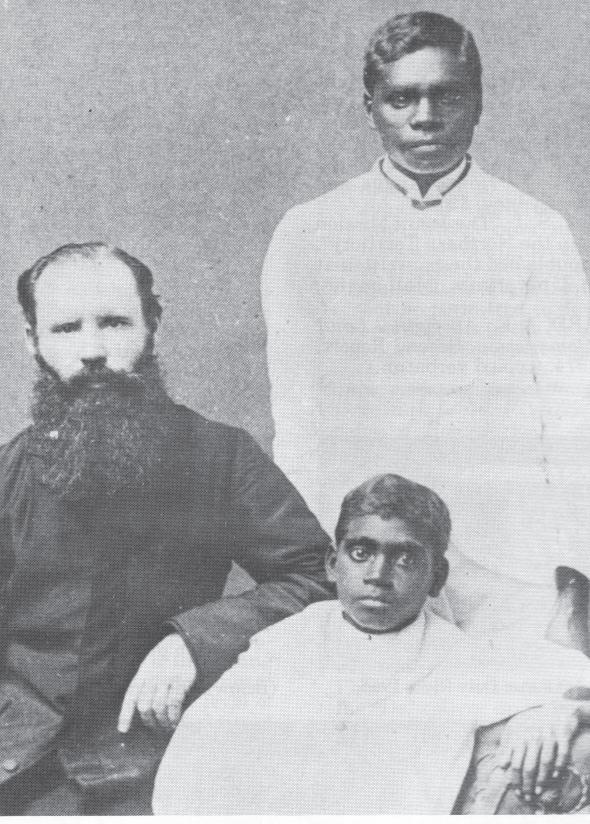
The first missionaries to Daly River were a group of 17 Jesuits, one of them the brother of Blessed Mary MacKillop (pictured at left with students from Daly River).
For 17 years they worked to evangelise and improve the lives of Aborigines. Forced to leave in 1899, their legacy was picked up and continued by Missionaries of the Sacred Heart in 1906.
THE great myth of our time is that the Catholic Church’s Marian doctrines are “warmed-over paganism”, leading apologist Mark Shea said during a 1-9 February tour of Sydney.
Shea, who launched his trilogy of books called Mary, Mother of the Son in Sydney on 2 February, said that the Catholic Church’s teachings about the Blessed Virgin Mary protect something crucial in our understanding of who Jesus is and of the truth of the Gospel.
During a tour addressing thousands of youth at Roman and Maronite Catholic centres over the past two weeks, Shea defended Marian doctrine from Protestant accusations of being ‘invented’ by the Church. Seattle-based Shea, 51, who has four sons with wife Janet, told The Record on 3 February that the Church’s Marian doctrine, including its four dogmas regarding her, is reflected in Scripture, reinforces faith in Christ and the truth of the Gospel, and is always “a commentary on who Jesus is and therefore on who we are”.
“As Pope John Paul II taught, Jesus doesn’t just reveal God the
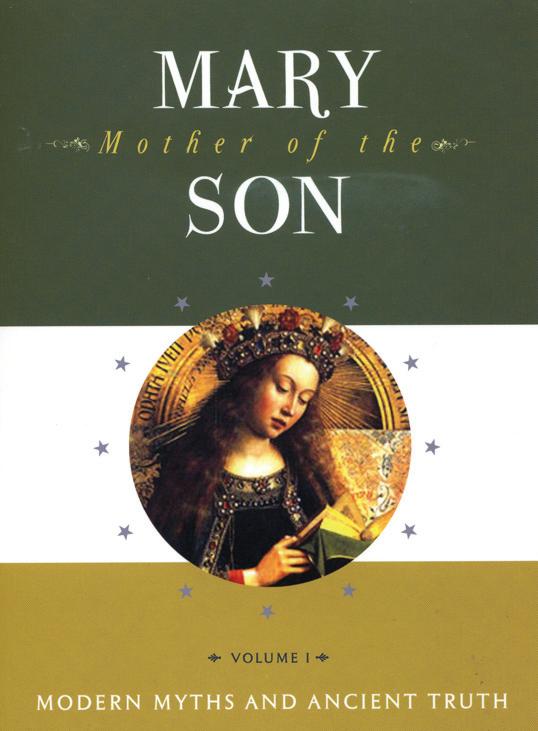
Father to us, He reveals us to ourselves,” Shea said.
The Church’s four dogmas regarding Mary are that Mary is Theotokos (ie, God-bearer or Mother of God), her perpetual virginity, her Immaculate Conception and her Assumption.
Each of these dogmas were declared during periods when a concept of Jesus’ identity was under threat from a prominent heresy of the time.
In the case of the dogma of Mary as the Mother of God, declared at the Council of Ephesus in 431, an early heretic named Nestorius regarded Jesus as “an ordinary guy” who was occupied by the second person of the Trinity, two separate people occupying the same head, Shea said.
Jesus, however, is one per-



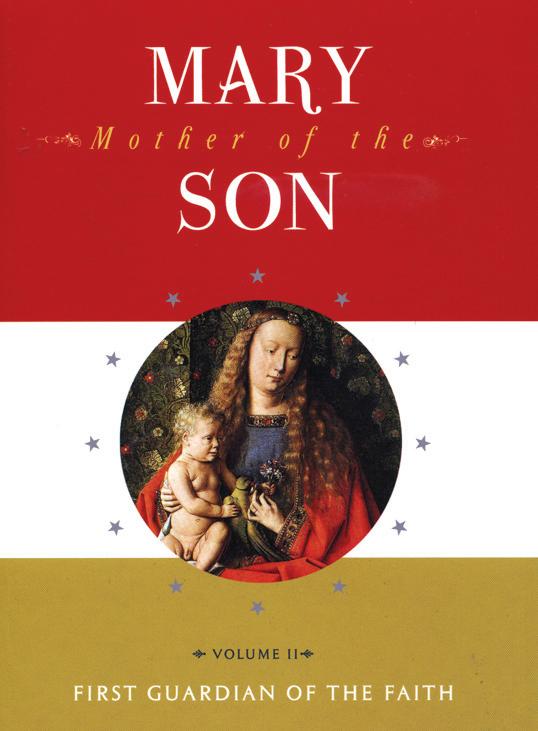
son, with a divine nature and a human nature. Therefore, Mary is the Mother of God. All Marian doctrines, Shea added, come out of the Church’s apostolic tradition while terms like “Immaculate Conception” did not appear until much later. Shea said that the Apostles and Fathers of the Church regarded her as sinless and all-holy.
The doctrines are also based on reflection and logic. “Mary didn’t have any other children; and the Church, reflecting on that fact, saw theological significance in it; it’s the same with her assumption into heaven”.
“So the Church defines them as dogma because they tell us something crucial about Jesus, our relationship with Him, His power to save and so forth,” he said. The


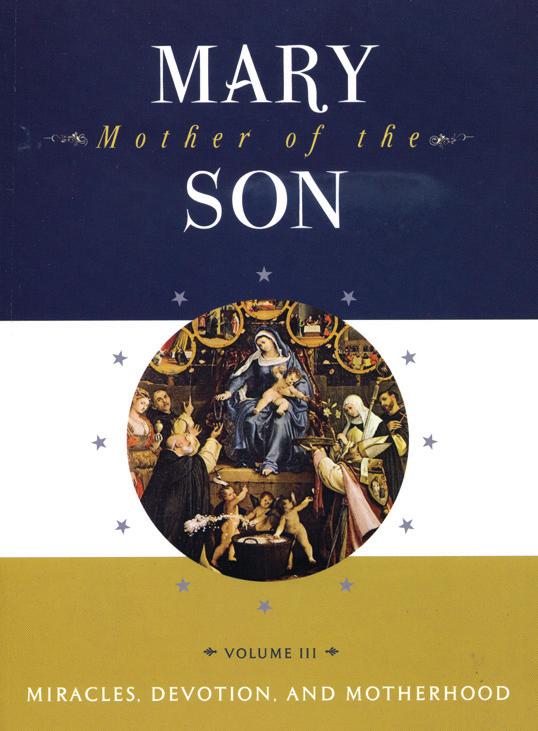
first book in his recently published trilogy, Modern Myths and Ancient Truth, looks at the question of “where does the Church get all this stuff about Mary? It is vital to answer this question because many people say it looks like the Church is pulling it out of thin air”, he told The Record
The second book, First Guardian of the Faith, looks at the four Marian dogmas and shows how Mary acts as the guardian of the faith in these dogmas.
The third book, Miracles, Devotion and Motherhood, looks at the devotional side of Marian life and what the Church teaches about the Communion of Saints and prayer to the saints. He also delves into the devotional life of the Church, using the Rosary as the platform to look at other kinds






of devotions and titles for Mary. He further examines the phenomenon of private revelation, including various approved Marian apparitions such as Lourdes and Fatima, analysing how this relates to pubic revelation (the revelation entrusted to the Church by Jesus through the Apostles and closed with the death of John). Public revelation includes the writings of St Paul, who the Apostles themselves called an ‘apostle’.
He distinguishes between public and private revelation and how to deal with a Christian world that at times gets carried away - where “Jesus is showing up on grilled cheese sandwiches”.
Shea, who converted to the Catholic Church from an evangelical Protestant background in 1987, said that Mary is mother of all the baptised, “whether they like it – or know it – or not”. This concept is rooted in Scripture, he said.
“She’s not just a Catholic thing but a Christian thing, she’s mother of the Church. When Jesus said to John (at the foot of the Cross) behold your mother, he’s talking to every baptised person”. “Catholic teaching on Mary is profound, liberating, beautiful, wonderful and exciting,” Shea told The Record Shea, an editor for Catholic Exchange, a regular contributor to Inside Catholic and a speaker for Catholic Answers, has written numerous books including Making Senses Out of Scripture, By What Authority? and This is My Body.
The trilogy is available from mustardseed.org.au or call 02 9646 9000. $44.95 (+$7.65 p&h)





It is one of the slightly astonishing facts of the history of the Church that something such as liturgy can prove to be such a hotly-contested issue and even, on some occasions, divisive. Actually, there are a number of similar issues that have proved to be epoch-making in the Church and in the history of the world. One thinks of the debate over the use of images representing the divine that convulsed the Church in the eighth and ninth centuries. As a result ‘Iconoclasm’ became a byword for destroyers of culture and civilisation.
Another was the debate which was to reverberate for several centuries but which most notably erupted in the third and fourth centuries over the question of whether Christ, the Son, was begotten or unbegotten of the God the Father. Looking at the matter from a millenium and a half later one would not think that such a thing could possibly lead to persecutions, excommunications and imperial interventions in the Church.
A vaguely similar issue was part and parcel of the enormously complex and far wider picture to do with the most disastrous split within Christianity, that between East and West in the eleventh century. We still live with the regretful consequences of that disastrous event today, but we also live increasingly in hope that some kind of reconciliation may be close at hand. And so on. When one reads the history of the Church one finds almost nowhere any prolonged period of felicitous, harmonious and peaceful growth, but rather an episodic series of theological and historical conflicts and crises, often tumultuous but which, paradoxically, have contributed to the Church’s identity and understanding of itself. Conflict has often had the unintended benefit of forcing the Church to re-examine why it believes and teaches what it does, and, having re-acquainted itself with its roots, to go out into the world and fearlessly promote it.
PO Box 75
Leederville WA 6902 cathrec@iinet.net.au
Tel: (08) 9227 7080
Fax: (08) 9227 7087
For the last half a century the liturgy of the Church has been one such issue, although nowhere near as divisive as the examples listed above. It has certainly been the key emblem of a deeper distrust that has led to one minor schism over the issue of the Second Vatican Council. The Latin Mass may have been the standard about which a small number of schismatics rallied, but in actual fact the real issue was their rejection of the teachings of the Second Vatican Council.
Often, the Church can, in a very real sense, be its own worst enemy. This is not really anything new because it happens to be an expression of the way people are in general. However, on the issue of liturgy, it seems true to state that this, yet again, has been the case for the last half a century or so.
What has certainly followed in the wake of the Council, magnificent gift of God that it was, was a period of invention in liturgy that may have been well-intentioned but was not completely faithful to the vision of the Council Fathers, many of whom were shocked, liturgically speaking, by some of the excesses that followed. In numerous ways parts of the Church behaved after Vatican II like a yacht sailing on a beam reach that loses its rudder and flounders in the swells depending on which way the wind and the waves are breaking. As a consequence the Church has spent too much time in recent decades baling out the boat rather than navigating the course it set out upon.
One of those who was at the Council and was occasionally shocked by developments within and outside the Church, including in the field of liturgy, was a young and very bright theologian called Joseph Ratzinger. Now that he is Pope Benedict XVI he has been given the opportunity to continue to do something about what has clearly been a big problem in the life of the Church, albeit one many bishops have not known how to handle. We can, in a limited way, sympathise with the bishops. They have, after all, been relentlessly beset by those demanding nothing less than an unconditional return to one way of celebrating the Mass on the one hand, and, on the other, those wanting nothing less than the option of pure invention occasionally bordering on liturgical anarchy. However, the signs are that this period of directionless drift is already waning as the real desire of the Council begins to be implemented more widely. It is true, as many have noted, that Councils take decades, and even longer, to be implemented.
Pope Benedict’s interest in the liturgy of the Church and dismay at some developments has long been known, and quite openly and extensively discussed by the Holy Father himself. It is clear that he, like his predecessor, has long wanted to carry out a renovation of the liturgy in order to faithfully represent the desires of the Fathers of Vatican II. Hence the new prayers of the Mass which we Catholics will be saying, if current estimates can be relied upon, in about a year from now.
Many have argued back and forth the pros and cons of the new translations as if whatever is done will somehow increase or decrease the numbers of those in the pews as a result. What matters is not numbers but fidelity. Fidelity to the tradition and faith of the Church - and the texts of the liturgy as well - is something that every Catholic should be prepared to embrace as part and parcel of being a normal Catholic. Archbishop Mark Coleridge was quite correct at last week’s liturgy gathering to note that in some places in Australia the standard of liturgical training given to those in recent decades charged with the duty to implement or guide the liturgy in this country has been “pathetic.”
It is a strong word, but sometimes we just have to come out and name a thing for what it is. Rather than indulge in blame games, however, his talk is a signal that we all need to be grown up Catholics and just get on with doing things like adults rather than teenagers let loose on a spending spree with credit cards. As another speaker at the gathering said, critics of the new translations may not like it but now the time has arrived for them to make a choice.
The liturgical train is leaving the station. They need to decide whether they will be on board with the rest of us.
therefore somewhat incredible that Miller and others spend so much time attacking those who are quite correctly pointing out significant weaknesses in evolutionary theory. This is not the place to go into the strong arguments proffered by scientists whose views are defined as “Intelligent Design”.
Suffice to say, these arguments have been deliberately misrepresented, as has the whole concept of ID. In fact, these views have been in some instances censored in spite of the fact that democracies like the US purport to allow free speech and ideas.
Regarding articles relating to evolution recently published by The Record, the term ‘theistic evolutionist’ (as would apply to Kenneth Miller and Leslie Tomory) is an oxymoron.
The entire theory of evolution is based on a process that is random, undirected and purposeless. Chance rules the day. Organisms arise without the need for the intervention at any stage of a supernatural deity. The evolutionary process is considered natural and materialistic and, according to evolutionists, has given rise to all organic life on Earth, past and present, including human beings.
Humans, say evolution’s supporters, are simply part of this undirected, chance process. They are not here for any reason or purpose as prescribed by Christian belief, for example, and they have no special privilege over other species.
Taking all this into account, how can there be any compatibility or reconciliation between the monotheistic religions and evolution as defined in standard biological textbooks including those written by Kenneth Miller? There can’t beunless there are observations based on scientific study that the theory of evolution cannot explain.
Theistic evolutionists like Kenneth Miller, Francis Collins and Jeremy Coyne are part of a very tiny minority that find compatibility between religious belief and evolution using convoluted and obscure metaphysical arguments which are generally dispensed with using the “religious” gene proposition.
The vast majority of biologists who believe that evolution is completely factual (like Miller does) are dyed-in-the wool atheists, in fact very active evangelising atheists. In a nutshell, the theory of evolution is the cornerstone of atheism and gives it legitimacy and veracity. It is
I recommend to your readers that they consult books by Stephen Meyer, Bill Dembski, Michael Behe, Jonathan Wells and others to get the full fledged, undistorted arguments for ID before they passively accept those of Kenneth Miller and Francis Collins.
I would also like to see The Record balance its recent articles with comments from people like Stephen Meyer whose book Signature in the Cell is currently a best seller in the US.
Deric Davidson Bunbury WAIn considering the use of the term “Mystical Body of Christ”, we could do no better than refer to the scriptures: St Paul repeatedly and emphatically reminded the early Christians that they were “the Body of Christ”:
“you know, surely, that your bodies are members making up the Body of Christ” (1Cor. 6:15) to quote but one of at least a dozen such references.
Jesus’ use of the metaphor of the vine and its branches could well have been Paul’s inspiration. He certainly left no room in his writings for any misunderstandings.
The Risen Body of Christ has flesh and blood – we, the baptised, are the presence of Christ in the world. The incarnation was not a mere 30-year incursion into history; Christ continues his mission of establishing His Father’s Kingdom in the world of today through each of us. We are his flesh and blood presence.
The implications for this in our day-to-day living experience and, particularly, in our role in the celebration of the Eucharist, are beyond the scope of this letter.
We, the laity, besides nurturing priestly vocations, have the important task of realising who we are as the Body of Christ and
of developing our potential in that baptismal role.
Neil K Smith, Bull Creek WAThe Queensland government wants to “reform” surrogacy laws, apparently on the understanding that a baby is a toy and that anybody wanting one has a right to one. Let’s ask ourselves, is it not the duty of the State always to act in the best interests of the child - doing everything possible to ensure every child at least the chance to start life with the love and care of their real mother and a father. What right has a government to create motherless or fatherless domestic arrangements for children in cold blood, and then falsify that child’s birth certificate accordingly? Is not all surrogacy unjust? Does not surrogacy dump a child, without his/her consent, into complex, unnatural relationships, expecting him/her to like it or lump it?
Arnold Jago Mildura VICAlthough I wasn’t there, last week’s reporting by Anthony Barich on the national liturgical gathering was like oxygen. I want to get a copy of Archbishop Mark Coleridge’s address. What was reported in The Record was exciting and encouraging. Like many Catholics, I have watched as weekly liturgies in parishes (and I’ve lived in a number of eastern states dioceses as well as your state) have become about as inspiring as wet lettuce. True, this is less an issue of what is officially said than how it is conducted. A time for reform has well and truly arrived. Speaking as an ordinary Catholic, I can honestly tell anyone reading this that if I wanted to introduce a friend to the Catholic Church I would find it difficult to bring them along to the average suburban parish Mass. It would be just too embarrassing. I’m not a scholar. But I do know a parish Mass is not meant to be a TV game show or a barbecue. I want to say and pray what the Church has given, not ‘absolutely fabulous’ concoctions from anonymous designer liturgists.
N
Bennet Ballarat
Mercy Hospital Mount Lawleyis a private not-for-profit hospital, 5km from the Perth CBD on the banks of the Swan River providing 240 acute care beds along withcomprehensive surgical and medical facilities. Further information about the Hospital can be found on our website, www.mercycare.com.au
We are committed to employing a caring and dedicated team of employees who provide services that enhance the quality of life in the community. Staff are called to behave in such a way that upholds the Mercy Mission and demonstrates the Values of Compassion, Justice, Respect, Integrity and Excellence and to work co-operatively and collaboratively in the Hospital’s ministry of healing and health care.

We have a vacancy for a Pastoral Carer, working part-time (0.5FTE) who is primarily responsible for providing pastoral care services and religious ministry for the spiritual wellbeing of patients, families, volunteers and staff throughout the Hospital.
For a current position description and selection criteria, please refer to the website.
Further information about this position can be found by contacting Bernadette Brady on 93709366.
Please forward your applications, addressing the selection criteria and attaching a current CV, to Human Resources, Mercy Hospital, ThirlmereRd, Mount LawleyWA 6050 or email hrhospital@mercycare.com.au . Closing date for applications is Thursday 25th February, 2010.

It would be incorrect to view the diaconate following the same trajectory as other ordained ministries (priests and Bishops) in the Church. These, while at the service of the Church and the Kingdom of God in the world, share some common characteristic. But we might boldly claim that in the life of today’s Church, the emphases and roles of diaconate have been shifting towards that world stage on which the joys and pains, struggles and achievements of the people of God are lived out. A brief glance at the different forms diaconal service is taking in different continents will reveal that this ministry is very

The permanent diaconate: Its genesis, growth, issues.
By Anthony Paganoni CSclosely connected with the evolving history and struggle of the individual nation and continent.
But that would only be one side of the coin. The other side, concerned with the life of the Church, would focus on the relationship of this ministry with the development of lay ministries. These have flourished in the so-called mission countries. And statistically, at least, it would seem that the growth of lay ministries – particularly in poor countries - has not led to a corresponding expansion of the diaconate. But let’s have a look at the various arrangements: how it is lived in North America, in South America, in Asia and Oceania and in Africa.
Some 70 per cent of the total number of deacons are in North America, with 15,763 in the United States alone. There, deacons live in a socio-religious context, clearly marked by ethnic diversity, at the forefront of the process of “hispanisation” of American Catholicism and the consequent fragmentation of cultural expressions.
In the US, the diaconate has taken on four characteristics reflecting the main concerns during the pre-ordination training period. These are: cultural diversity, the family, ecumenism and social justice. These areas of investigation and concern are seen as priorities during the actual formation period, simply because of the consensus that these are the areas that will occupy most of the attention of deacons when they join the active ministry.
I might add that, after the events of 11 September, the American Church has had to reassess some of its priorities in a changing sociopolitical scenario. I am not aware that deacons in active ministry have been invited to be part of the process. But I do believe that their voices and experiences, resulting from close contact with the people to whom they minister would have been a valuable addition.
 (1832-1883),
(1832-1883),
‘Religion has given rise to destruction and violence.’
 By Fr Sean Fernandez
By Fr Sean Fernandez
This opinion is commonplace and seems so obviously true that it needs no proof. In the face of this certainty, Catholics may feel awkward. For my part, I do not believe it to be true and I marvel at the simplistic judgements passed by some of our contemporaries on history.
I marvel at the lack of historical awareness or serious research behind their judgements. If you were to read a survey of historical scholarship on the crusades like Norman Houseley’s Contesting the Crusades, you would become aware of the varying interpretations of historical events.
You would also be aware that history has been used to further confessional and ideological concerns; I would suggest and shall try to demonstrate in future articles that some of those things we take for granted vis-à-vis the Crusades and the Inquisition are contestable.
I think that the caution expressed by the International Theological Commission (ITC) in its Memory and Reconciliation: The Church and the Faults of the Past is salutary: past events are ‘not completely reducible to the framework of the present, but possess an objective density and complexity that prevent them from being ordered in a solely functional way for present interests’.
The caution which historical study requires does not mean that we should not make judgements about the past, just that we should take care when doing so – hard work is needed.
Even as we acknowledge past failures, we should not neglect the heroic witness and faithfulness of past generations. Did you see the episode of Elders on the ABC in which Fr Des Reid was interviewed? His story is an eloquent witness – it is a story of weakness and grace or, rather, grace in weakness.
It is a story one finds writ oft in the history of the Church. Pope Pius XI, in his 1937 encyclical letter to the German Bishops and people condemning the atheistic-pagan ideology of Nazism, acknowledged that the Church’s divine mission, carried out as it is by frail human beings, may be obscured by human sinfulness.
“Cardinal Ratzinger in a 2003 interview said that out of the sea we pull not only fish, but detritus; in the field of the Church there are weeds as well as wheat.”
The Church must be clear about sin when it is committed, but he goes on to write that to ignore ‘the overwhelming sum of authentic virtues, of spirit of sacrifice, fraternal love, heroic efforts of sanctity’ is to be blind and unjust.
And if the person who hates the Church and judges her harshly does not apply the same exacting standard to other institutions, ‘then his appeal to an offended sense of purity identifies him with those who, for seeing the mote in their brother's eye, according to the Saviour's incisive words, cannot see the beam in their own’ (Mit brennender Sorge)
The words of Pope Piux XI are as relevant now as they were then. In considering the issue of violence, those who criticise the Church should be willing to focus the same, unforgiving light on other institutions and on themselves.
These critics, in laying the blame for violence at the feet of religion, appear to ignore the terrible destruction and bloodshed that atheistic regimes have inflicted on the world. Nazism in Germany, Communism in the USSR, Pol Pot’s murderous regime in Cambodia and Hutu power ideology in Rwanda have brought about a loss of life unimaginable in previous centuries. As I hope to explore, the Gospel as well as inspiring virtue has also tempered
violence through history. Do you not wonder at the self-righteous indignation of those who inveigh against the evils of the past? Who are we to gaze on past generations from the vertiginous heights of moral superiority? How many wars have modern, secular democracies, including Australia, waged? How many people are dying as I write, dying in Iraq, Afghanistan and so many other places around the world? Are we too ready to see the mote in our brother’s eye and ignore the plank in our own?
To criticise the Church for the sinfulness of its members is to misunderstand the nature of the Christian family. We Christians do not claim to be better than everyone else.
Jesus tells us that he did not come to call the perfect, but sinners. Cardinal Ratzinger in a 2003 interview (tinyurl.com/yfl8cls) said that out of the sea we pull not only fish, but detritus; in the field of the Church there are weeds as well as wheat.
Indeed, he went on, the choice of St Peter indicates that we should not expect the Popes to be saints, but sinners!
Three years earlier in a press conference, Cardinal Ratzinger recalled the words of Cardinal Consalvi who, being informed of Napoleon’s wanting to destroy the Church, said, ‘He will never succeed; we have not managed to do it ourselves.’ We are sinners but it is not the Gospel which inspires or causes our sinfulness; it calls us to turn from our sins and follow Jesus; the Gospel saves us from our sinfulness.
Our critics may not be convinced by history or argument, but we need not fear their judgement. Our judge is the Word of the living God. This Word calls us continually to repentance and to a change of mind and heart.
The Archbishop of Dublin, facing up to the failures of the past in his Christmas Midnight Mass homily, spoke not only of the need for transparency and of new structures, but also of hope and renewal: ‘What are the Church’s mechanisms of renewal?
They must begin by turning again to the word of God. God reveals himself in Jesus as the Word, the concrete expression of who God is.’ In every age we turn again to God’s Word, Jesus Christ, whose new creation the Church is. This Word is the life of the Church and the hope of the world.
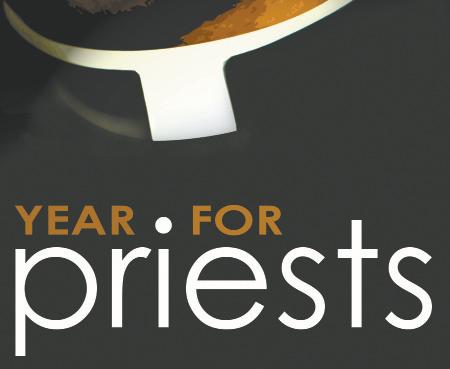
For the Year for Priests, 65 Australian and New Zealand priests made a group pilgrimage to the Holy Land earlier this month. Often called “the fifth Gospel”, the Holy Land continues to pull at the hearts of many, and a pilgrimage made the priesthood, and the stories of Jesus and the Bible, come alive in a new way for these priests.
Wellington priest Fr Tim Cahill was one of the first group of 34 priests from all around Australia who began their 10-day pilgrimage on 1 February.
After spending time in Bethlehem, where Jesus was born, the group travelled up the coast via Jaffa, Caesarea, to Haifa, where Fr Tim had the unexpected privilege of celebrating Mass for the other priests in the Basilica containing the Cave of the prophet Elijah on Mount Carmel.
After visiting many of the sites associated with Jesus in Galilee (Nazareth, Cana, Nain, Capernaum, Korazin etc), the priests returned via Jericho and the Jordan Valley to Jerusalem, where they celebrated Mass in the Church of the Holy Sepulchre, as well as following the original Way of the Cross and spending a prayer vigil at the Garden of Gethsemane.
The return home came all too fast.
For Fr Tim, one of the real highlights of the pilgrimage was meeting and sharing with some of the local Christians of the Holy Land.
“Not only a beautiful land with wonderful people” said Fr Tim, “but this pilgrimage is a joy I will treasure for the rest of my life.”
Fr Don Kettle Parish priest of City Beach, Archdiocese of Perth
As I reflect over the past ten days of my pilgrimage through the Holy Land, I can’t help but feel a total sense of gratitude to God and to my brother priests who travelled with me. It certainly has been a self-revelation and recreational unique experience, having learnt more about myself and the tremendous gift of the priesthood.
Visiting the Holy places where Our Lord once lived brought with it the reality of His life and the Scriptures come alive by retracing His steps.
I owe much to my brother priests who travelled with me, for their acceptance and unconditional fra-
ternal love that unites us all in the brotherhood of the priesthood with Jesus Christ the High Priest. Through His priests I experienced the humanity of Christ in the priesthood and I also experienced the divine presence of God working through His priests, for which I am eternally grateful.
I take this opportunity to thank Harvest Pilgrimages, especially Phil Ryil and Chris Hohnen, for making this possible.
May Our Lord continue to bless them for the important work they do by evangelising people through the pilgrimages they offer to the Holy places throughout the world.
Fr Peter Stojanovic Wagga WaggaJust before leaving Australia, in a final email I expressed how “I particularly look forward to celebrating Mass on the Sea of Galilee”. One of the lowest points below sea level in the Holy Land, this was to become for me very much a high point.
When it was mentioned that all the priests on tour would have their names put in a hat from which to select leading priests in the liturgy, I said to a confrere also travelling on the pilgrimage, “I would love to be picked to lead the Mass on the Sea of Galilee.
Let’s pray for each other that one of our names is drawn from the hat”.
Unbeknown to me, my brother priest, from Wagga Wagga diocese, added a private prayer: “Lord, if I am chosen to lead Mass at Galilee, I will swap with Fr Peter”. A dream came true. A prayer was heard.
Against the odds, my confrere’s name was picked for Mass on the Lake of Galilee, and he made a generous gift of the opportunity to myself, Fr Peter Stojanovic. St Peter himself was surely smiling that blessed day, on waters unchanged since 2000 years ago when Jesus and a faith-filled disciple walked on them.
Fr Charles WaddellParish priest of Claremont, Archdiocese of Perth
A pilgrimage to the Holy Land sounded like a wonderful opportunity to draw closer to our dear Jesus: what a wonderful chance to see Jesus by following in His footsteps. The reality of the pilgrimage, however, is so much more magnificent than my expectations.
Walking in the places that Jesus walked has awakened my heart anew to the wonder that all is grace. We are only seeking God because He is first seeking us and longing that we let Him love us.
Rather than a voyage of discovery then, the pilgrimage is a journey of listening and allowing Jesus’ message of God’s boundless love to overwhelm us, just as it did to His people of the Holy Land 2000 years ago.
This pilgrimage exceeded my expectations - not only with guides, carers and liturgies - but with the realisation that God’s pilgrimage to me, to you, through Jesus, is the very result of human life.
Fr Bob Harwood Sacred Heart Church, Booval“How good it is to be here” said St Peter to Jesus on Mt Tabor and certainly, these are my words too as I stand on Mt Tabor today (4 February). With the generous offer from Harvest Pilgrimages in the Year for Priests, it was too good an opportunity to pass up.
The Scriptures are always very particular in mentioning the names of places. To visit these places is a very special privilege.
As people we always have a connection with places; and the places of the Holy Land are names I have grown up with, but I have never felt more connected with them and to the stories of Jesus as I do now.
To look at the people of the Holy Land today; they live in ways similar
Indian priest runs his thriving youth ministry back home while filling in at Perth parishBY GLYNNIS GRAINGER
Record contributor
AN Indian priest has continued running his diocesan youth ministry back home while in Perth as acting parish priest at Innaloo/ Karrinyup.
Fr Mathew Vianney Malapati, 43, plays a key role in the Indian Catholic Youth Movement (ICYM) which aims to empower youth and help young people establish new goals and directions in their lives.
Fr Mathew, who arrived in WA on 5 December 2009, left Perth again for his home
in Andhra Pradesh on 7 February. He was ordained in 1994 in Nellore diocese, Andhra Pradesh, aged 27, and now works in a youth ministry in leadership training programmes in the diocesan ICYM in South India, where he is diocesan youth director for Nellore diocese. This is his fifth visit to WA. In 2003 he visited the Spearwood parish for 14 months; then every year he spends two months in the parishes of Highgate, Maddington, Innaloo and Whitford.
When I was in Highgate in 2006 for two months, he came into contact with the Catholic Women’s League Applecross branch
to ours. There is business, traffic and aggression in the lands. There are people desperate for survival.
Many seem unaware of the wonder of this place and the way God has been active in their history.
To see this makes me more conscious of the need to be aware of the same God, who has been a part of history of my own nation and to acknowledge that Jesus is present to us in our own nation’s struggles and joys.
Fr Richard Thompson Parish priest, Young, NSW Canberra-Goulburn ArchdioceseAs I write these thoughts, I am sitting in the shadows of Mount Tabor, scene of the Transfiguration. I am reflecting on the journey of my priesthood as I immerse myself in this wonderful pilgrimage. It is 30 years since I entered the seminary and 25 years this year since my ordination to priesthood. This pilgrimage is so important for me personally and is helping reveal the mystery of answering God’s call to spread the Good News. I am so aware of the people who have helped me in my priestly journey, and even more profoundly aware of the people in my parish who support me.
Each night I am so conscious of the faces and names of those who are making this pilgrimage in spirit with me. The places where we say Mass each day are so rich in the presence of Christ and this, with the faces and names, moves me emotionally. I am truly blessed and am already planning how I can help others go through the Mount Tabor experience, both spiritually and in the flesh, as I am now.
Fr Andrew Benton Cronulla NSWThe opportunity to visit the Holy Land as a newly ordained priest is one of those times I will never forget. After so many years of reading
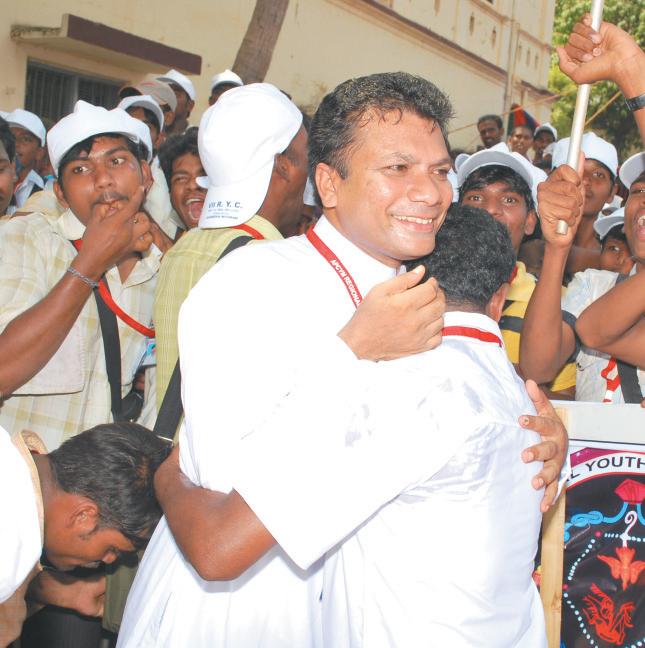
which gave him $240. Archbishop Barry Hickey also gave some money for computer training for the rural youth in Nellore diocese. Every summer school holidays in April-
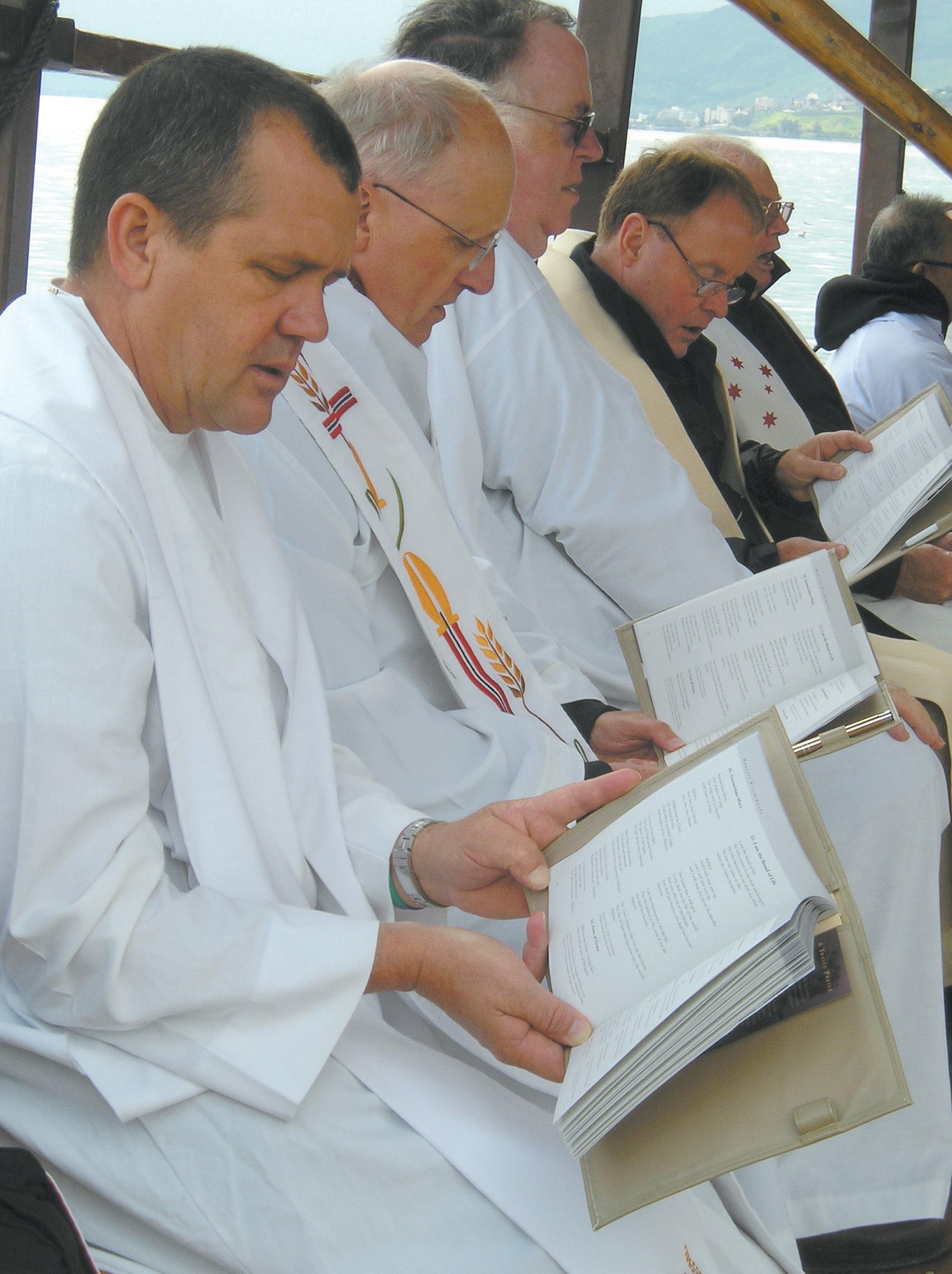
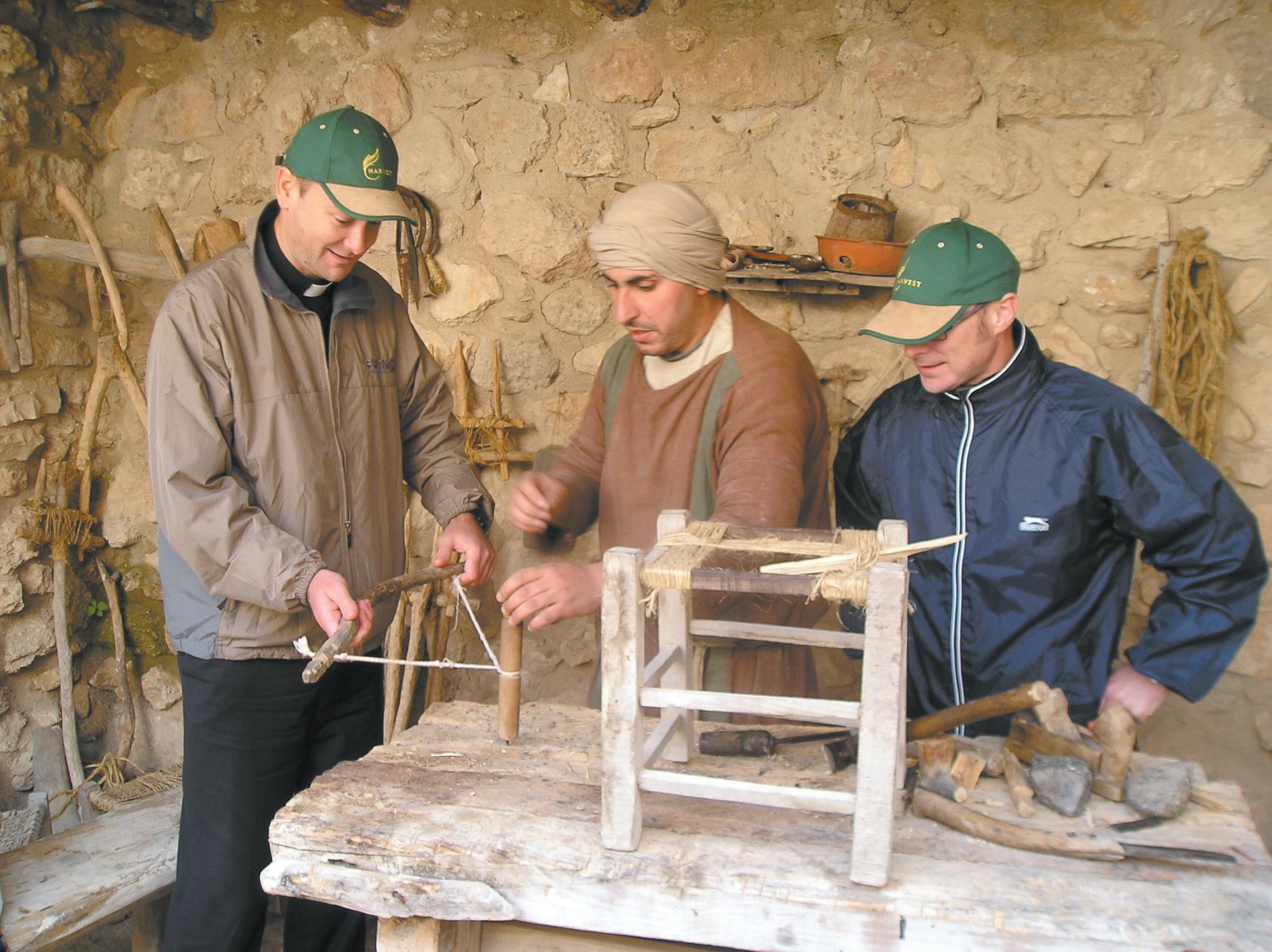
the scriptures, it is now awe inspiring to pray those words in the land where they were written and first spoken. Harvest has provided a wonderful opportunity for priests to respond to Pope Benedict’s proclamation of the Year for Priests. To visit the holy places where the Lord lived His public ministry, and also those places where He was born and lived His hidden life, is so great an inspiration for my own priestly ministry. I would encourage any priest who has always wanted to visit these holy places, to make this great pilgrimage of our faith.
Fr Peter Sheedy
Parish priest of Victor Harbor, SA
In this “Year for Priests” and this
40th year of my priestly life and ministry, I am a pilgrim in the Holy Land. To be a pilgrim is to travel great distances physically but more importantly is the journey in faith into one’s self.
To visit, pray and experience the daily life of Jesus in his time and culture is rich in wonder and gratitude at the wonderful committed love of God for his people.
Emmanuel – ‘God-with-us’, immersed deeply and fully in our humanity is seen and appreciated in a new light.
To touch and be touched by the things that were so much a part of the life of Jesus, of the men and women of the Jewish and Christian scriptures brings a renewed excitement about our faith and who Jesus is for me.


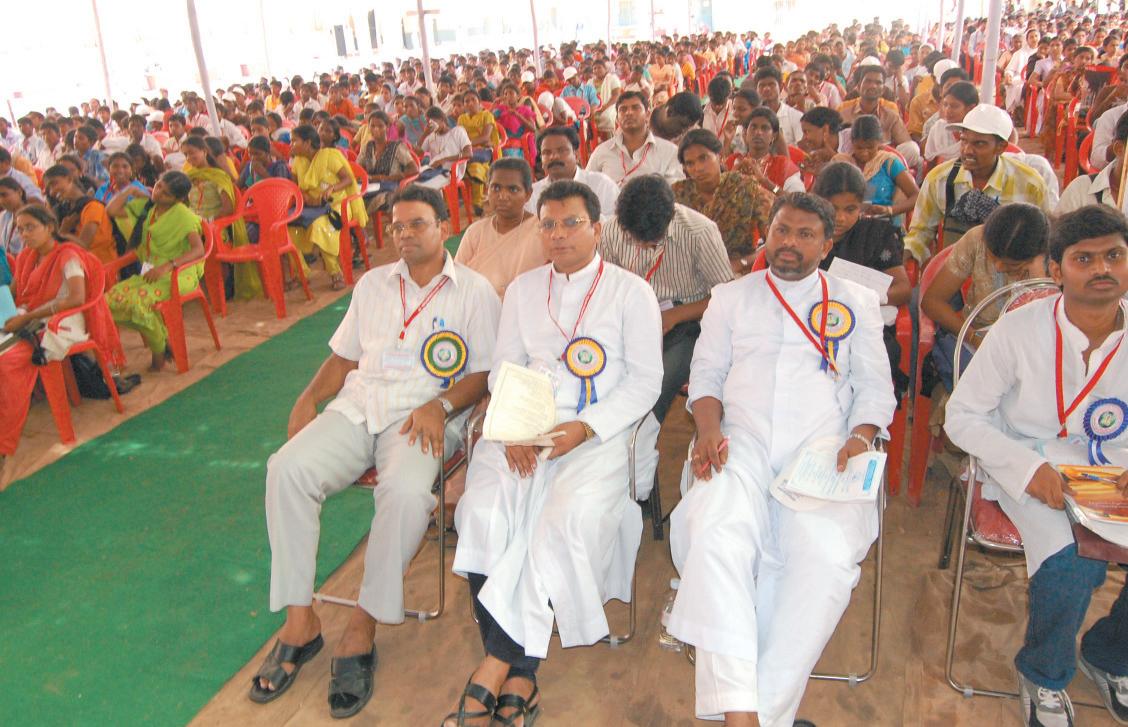
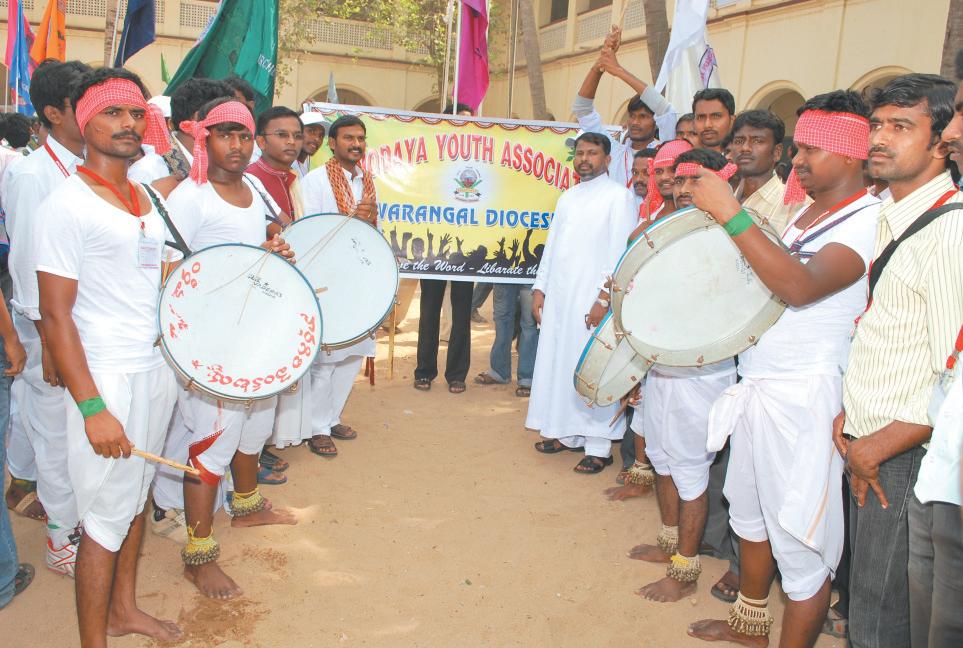
May he runs the programme. He also held a Regional Youth Convention in a big tent from 1-5 May 2009 in Nellore, with 1,000 youth and more than 50 priests.
A rally was held on the last day (and) people stayed in the schools for accommodation –boys and girls separately.
Fr Mathew, born in Tamil Nadu, India
where his mother and sister still live while he works as a missionary in Andhra Pradesh, helped organise it and took photos of the rally, which took place in 45C heat, and gave them
to The Record as an example of what can be done in extreme circumstances. The theme of ICYM for 2007-2010 is Live the Word - Liberate the World and the thrust of the rally was to eradicate poverty, rejuvenate the environment and build a culture of peace. He teaches the young people in Nellore to be aware of it and how to control AIDS; how to behave with AIDS patients and how to take care of them. On the side, he also plays soccer, cricket and volleyball.
The ICYM has 160 independent zonal youth network centres, 12 independent regional coordination centres and a national office in New Delhi, with more than one million members between the ages of 15 and 30.
There is outreach to the educated and uneducated, rural and urban youth, without any discrimination of caste, creed, sex or religion in all the states of India.
The motto of the ICYM is: To lead, to serve, to shine and its goal is to foster and promote youth leadership for a new India. Its objective is to develop youth into a formidable force for nation-building and for the Church, by empowering and equipping them.
At St Dominic’s parish Innaloo, which is joined with Our Lady of Good Counsel parish, Karrinyup, he stood in for parish priest Fr Nicholas Perera who is originally from Sri Lanka.
He and two nuns brought a group of eight young people from India to Sydney for WYD 2008.
The group spent a week at Innaloo parish, then another week at Whitford parish before going to Sydney.
These two parishes raised money for the pilgrimage air ticket.
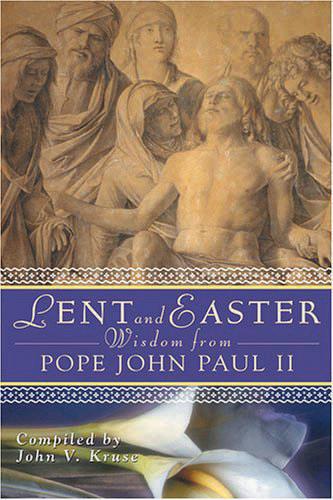

Lent and Easter Wisdom from Pope John Paul II
In Lent and Easter Wisdom from Pope John Paul II, the late Holy Father’s thought-provoking words lead readers through a journey of conversion throughout the Lenten season and Easter week. Each daily reflection - from Ash Wednesday through the Second Sunday of Easter - begins with thoughts from Pope John Paul II, supported by Scripture, a prayer, and a suggested activity for spiritual growth.
$19.95+ P/H
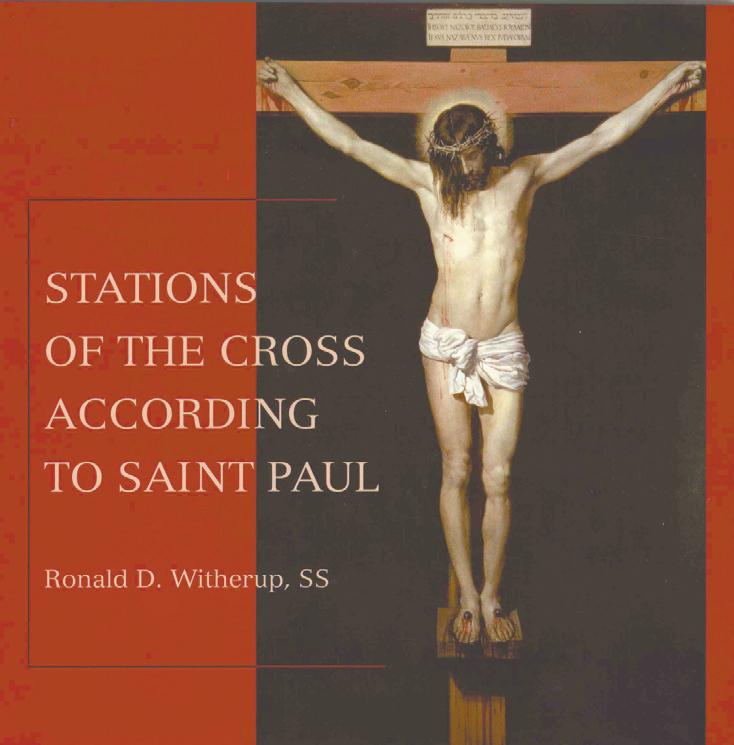

Mother’s and my Way of the Cross
This story of caregiver and receiver is an honest look at what many of us face, in one form or another, in our own lives. Lawler’s experience would go a long way in helping us do our best whatever the circumstance, particularly in relation to the aged. Mother’s and My Way of the Cross is a wonderful gift for anyone who is caring for or has given care to an aged relative. Chapter titles include living with decisions, being afraid, making mistakes, and picking up the pieces.
$15.95 + P/H


Daybreaks: Daily Reflections for Lent and Easter Week
Fr Kavanagh takes the reader on a Lenten journey that opens a door to understanding the mystery of Christ’s redemptive mission. These reflections take only a few moments, but allow time for the words to sink in, for the message to unfold.
$2.50 + P/H
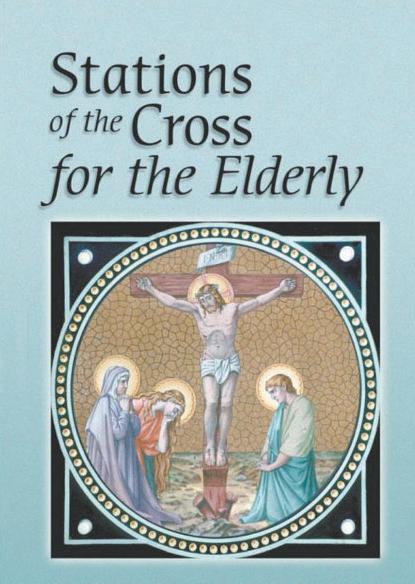

This booklet brings the infinite power of prayer to bear on the loneliness and suffering of our ageing loved ones. This beautiful meditation unites readers with Jesus, engaging them in an intimitate discussion of the indignities, pain and heartache Our Lord endured as He bore His cross, recognising the similar crosses the elderly so often have to endure.
$13.95+ P/H
$17.95 + P/H
St Paul: A Bible study guide
Immerse yourself in the person of the Apostle Paul, heroic in his martyr’s death, but so recognisably human in his conversion story and subsequent letters to the faithful. Gain fresh insights into your own personal growth potential through the Scripture of St Paul:
* What does Paul’s conversion have to teach me about how power is perfected through my weaknesses?
* In what ways might I imitate his care and concern for the world?
$19.95 + P/H






St Paul on the Power of the Cross
Mitch Pacwa authored a wonderful resource for anyone who wishes to study the theme of the Cross in the Letters of St Paul. The book includes salient Biblical passages as well as a commentary on them which reflects modern Biblical scholarship for greater insight. Good questions and Bible searches enable the reader to get to the core of Paul’s teachings on the Cross of Christ. I recommend this book for individual Bible study and even more so for small group sharing.
$19.95+ P/H
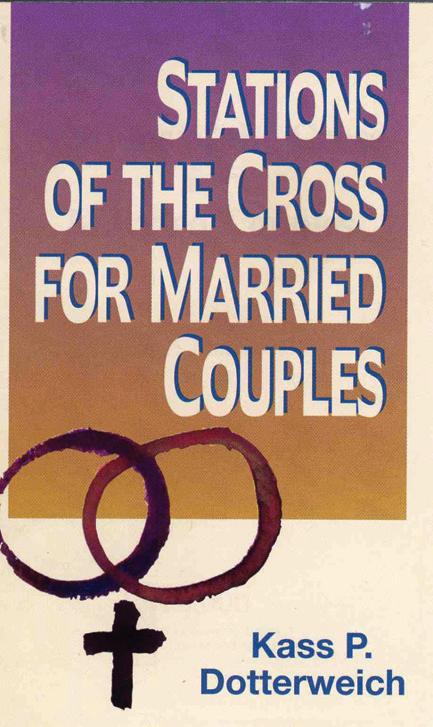

Stations of the Cross for Married Couples
By Kass P Dotterweich
Journey through the Stations of the Cross, with each presenting a reflection on Jesus and a prayer devoted to married couples.
RRP $1.95
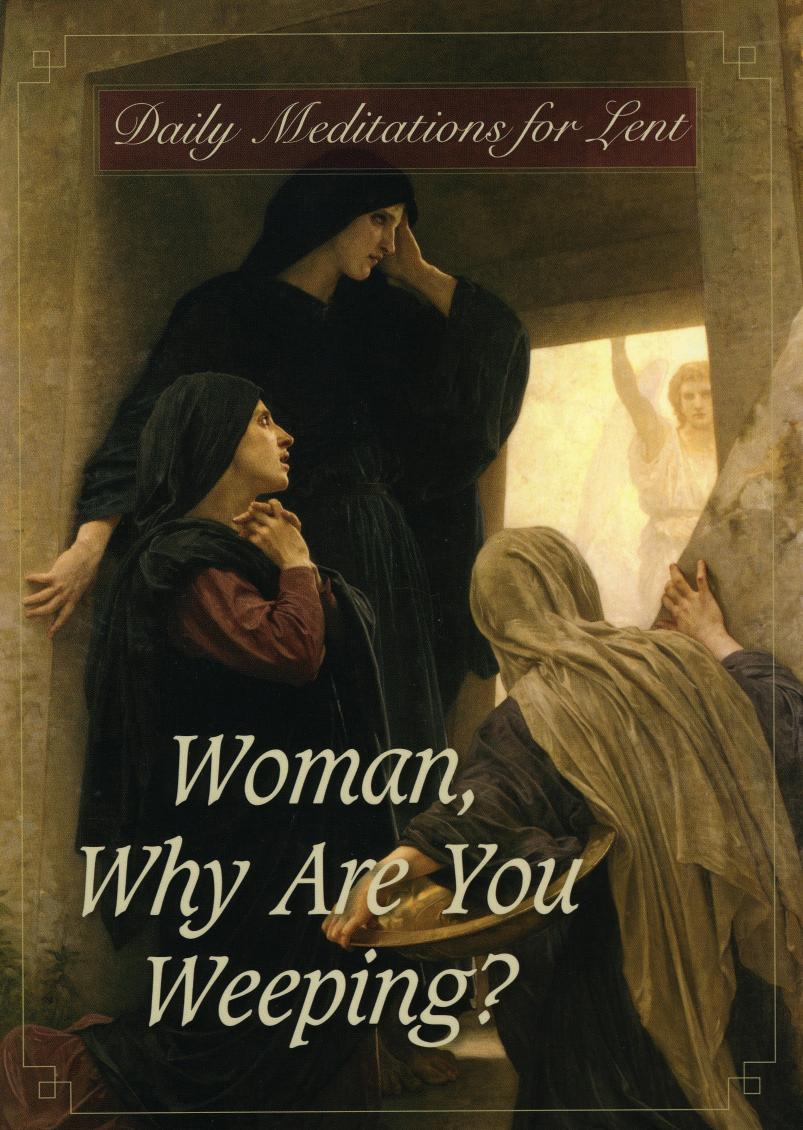

Woman, Why Are You Weeping?
With a Scripture passage and prayer for each day, this book probes the heart of Christ’s love for us and our love for Him during the Lenten season. Each meditation focuses upon a name or title ascribed to Jesus in the Bible, considering its significance to our experience of Lent.
$21.95+ P/H


CARITAS Australia’s Project Compassion, the largest fundraising event for aid and development in the country, is under way giving Australians a chance to support the poorest communities in the world realise a better future.
Caritas Australia is part of an international network that works in over 200 countries and territories, empowering communities to help themselves out of poverty and take control of their future.
With the theme ‘Blueprint for a better world’, this year’s Project Compassion focuses on The Millennium Development Goals (MDGs), an eight step global action plan for halving world poverty by 2015. Money raised will support Caritas Australia’s work with local partners, who are improving their own lives by addressing issues such

as health, education, gender equality, water and sustainable agriculture, priorities which are set out in the United Nations MDGs.
Since 2000 the MDGs have reduced the number of people living in extreme poverty by 25% while enrolment in primary education in poor countries, the bedrock of building a prosperous future, has risen to 88%. However, without concerted action, such advances may be lost. In our own backyard of the Pacific, none of the MDGs are on track to being achieved.
Caritas Australia works to achieve the MDGs by enabling communities to take control of their own lives. In Cambodia, Samon (14) lived with his Aunty Tou in poverty after his parents died from HIV/AIDS-related illnesses. His Aunt explains the hard-
ships they faced: “Before, I was selling fried bananas but no-one buys them in the dry season. It was so difficult to find enough food for my family, pay medical expenses and send Samon to school.”
However, in 2006, Aunty Tou and her family received assistance from a Caritas Australia supported Community Empowerment Programme that aims to alleviate rural poverty. While Aunty Tou received small business training and a loan, Samon was able to attend the project’s youth group that promotes, hygiene and games to reduce stigma and raise awareness of HIV/AIDS.
Donations can be made to Project Compassion at 1800 024 413 or at www.caritas.org.au or by post: GPO Box 9830 in your capital city.
Published by: The Victoria League for Commonwealth Friendship of Western Australia
REVIEWED BY BRIAN PEACHEY
A collector’s item
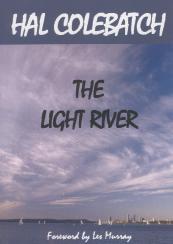
This book is a collector’s item because it is yet another piece of Colebatch’s literary eloquence. It is also a valuable piece for all who are associated with The Victoria League and the families involved with the League over the past hundred years. When I reviewed his book The Light River I wrote: “Hal Colebatch has done it again! He has proved himself – if proof was necessary - to be one of Australia’s leading poets. We in Western Australia are fortunate to have in our midst such a towering literary figure.”
Although of a different genre, my comments are pertinent to the subject of this review.
It is important to remind readers that The Light River was awarded the 2008 WA Premier’s prize for poetry.
The primary purpose of the book is to celebrate the centenary of the formation of The Victoria League in Western Australia and therefore it is a history of the League, but it is more than that. It is far from being a dull account of its formation and the portrayal of the many generous people who built and sustained the organisation for such an incredibly long time.
of 120 members. The patrons were the Governor, Sir Gerald Strickland, Lady Strickland and Lady Dudley. The President was Sir Edward Stone.
The League was to be nonpolitical and strictly non-sectarian, but espouse patriotism and promote the best of British culture. It was to be a ‘service organisation’ doing good for the less fortunate. This was illustrated later, especially during the two World Wars when tons of clothing were gathered and made for the troops and shipped overseas with other items of ‘comfort’.
Colebatch covers the problems faced in the formation of the Commonwealth and sees value in maintaining it, which was supported by Queen Elizabeth in her 2009 Christmas message:
“The Commonwealth is not an organisation with a mission. It is rather an opportunity for its people to work together to achieve practical solutions to problems.
In many aspects of our lives, whether in sport, the environment, business or culture, the Commonwealth connection remains vivid and enriching … I am confident that this diverse Commonwealth of nations can strengthen the common bond that transcends politics, religion, race and economic circumstances.”
The book is a valuable asset or tool for The Victoria League and also for other like organisations and clubs experiencing a declining membership. In the introduction and also in the conclusion, Colebatch refers to the study of the American political scientist Robert D Putnam, Dillon Professor of International Affairs and Director of the Centre for International Affairs at Harvard University, Making Democracy Work






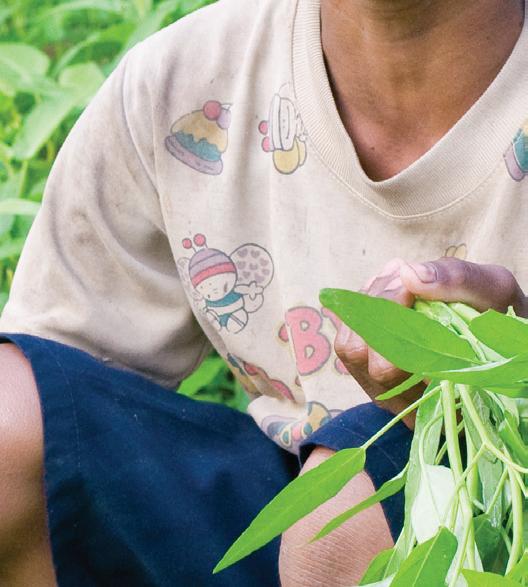















































The Victoria League was indeed fortunate to have a person with the highest literary skill, but also one who is an eminent historian. In the first chapter, The Queen, Colebatch sketches a succinct account of Queen Victoria’s exemplary life and her contribution to society – the gentle lady who ruled for so long, so wisely and so welland weaves through it valuable history of Britain, the British Empire, the beginning of the end of Imperialism and the formation of the Commonwealth.
The founding of the League in 1909 was a somewhat grand affair with the inaugural meeting being convened at Government House by the wife of the Governor, Lady Edeline Strickland, on 27 September 1909 with the immediate enrolment
Putnam’s thesis is that democracies flourish and prosper when they have the civic culture of clubs and societies providing what he terms social capital, defined as the instinct for trust and mutual obligation and a capacity for voluntary social and community action.
That and Putnam’s other work, Bowling Alone: The Collapse and Revival of American Community should be compulsory study for the leaders of The Victoria League and those in other organisations to motivate existing members to rebuild and increase active membership for the good of the nation.
Sadly, and with convincing proof, Colebatch describes the negative examples and the consequences where voluntary associations do not form or simply fail to advance or fall to pieces.
Continued from Page 1 truth. Previously I surrounded myself with people who were scared of me and told me what I wanted to hear. I had lots of power, money and women but it wasn’t enough. Romano is a member of the Disciples of Jesus Covenant Community. It is through his persistence and prayer that I went to one of their Life in the Spirit Seminars when I was released. I attended the seminar with my then partner (now my beautiful wife). It was there that I first heard the teachings of the Holy Spirit. I also had a Community of people praying for me. The sacrament of Reconciliation was great. Get the junk out of the trunk. It was God’s amazing grace that He put me in an envi-
ronment where people lived out their faith.
Now I visit Acacia prison weekly which is confronting. Once whilst driving there I was praying the Divine Mercy Chaplet and to St Michael the Archangel for his protection. Suddenly it hit me that I was loved by God unconditionally. Everything made sense after that. Now I just try and float that love out to my wife, kids and those around me.
I use my experiences to assist and teach youth. Some will listen and others are experiential learners. That’s the beauty of Christ. He gives us free will. I opened the door to God just a fraction and now I have a beautiful family and genuine friends. The Truth will set you free.
Pope Benedict XVI delivered an address to students at Rome’s pontifical seminary on Friday evening, 12 February, emphasising that “Christianity is not moralism”.
Reflecting on the 15th chapter of St John’s Gospel, the Holy Father said that believers must recognise the great gift of God’s grace and allow the mystery of God’s presence to “penetrate our minds and our hearts” - thus learning to abide in God’s love. The next step, the Pope continued, is to recognise how God’s grace produces results.
“It is not we who must produce this great fruit,” the Pope said. God’s action - the divine gift - precedes human action.
He cited the words of Christ to his disciples: “I do not call you servants any longer, because the servant does not know what the master is doing; but I have called you friends, because I have made known to you everything that I have heard from my Father.”
Here, the Pontiff explained, God has done something entirely new: “God has allowed Himself to be seen in the face of Christ.”
Unfortunately, the Pope observed, many people today still do not know Christ. He asked his audience to pray for the guidance of the Holy Spirit in order to help these people see the face of Christ. In those prayers, the Pope said, it is important to seek not one’s own goals but the will of God. Thus, he concluded, prayer involves a “process of slow purification, of liberation from ourselves.”
Speaking at a Vatican symposium, Cardinal Walter Kasper, president of the Pontifical Council for Promoting Christian Unity, said that an ecumenical catechism would help Catholics and members of major Protestant communities adhere more faithfully to the foundations of the Christian doctrine. Such a catechism would promote “an ecumenism of basics that identifies, reinforces, and deepens” Christians’ “common foundation in Jesus Christ and the Holy Trinity as expressed in our common creed and in the doctrine of the first ecumenical councils”.
A report prepared for the Anglican Diocese of British Columbia has found that Anglicanism in Canada is “one generation away from extinction.” Between 1961 and 2001, the ecclesial community lost 53 per cent of its members.
Of Canada’s 33.5 million residents, 43 per cent are now Catholic, while 23 per cent are Protestant (including Anglican). An increasing number of Canadians profess no religion. “The unchurched are not coming to us,” the report added. “Lapsed Anglicans are not coming back in sufficient numbers.”
El Salvador’s leading prelate warned that the rampant violence afflicting his Central American nation “threatens to overwhelm society.” In January, an average of 13 people were murdered every day.
“The escalation of violence has no limits: just as good is infinite because it comes from God, so evil can be without limits,” said Archbishop José Luis Escobar Alas of San Salvador on 7 February. “One thing is clear to everyone: the situation of violence is extremely serious and threatens the collapse of society, so we must respond promptly and effectively.” Eighty per cent of the nation’s 7.1 million residents are Catholic.
Demanding government protection from the protests of Muslim extremists and the hostility of local officials, representatives of the Indonesian Bishops and Protestant communities rallied at the nation’s House of Representatives on 9 February and spoke with legislators. “Earlier this month, more than 200 local residents protested at our church,” said one Protestant leader. “It ended with the Bekasi regency administration closing down our church, forcing us to hold regular services in the street.”
Of Indonesia’s 224.9 million people, 86 per cent are Muslim. 6 per cent are Protestant and 3 per cent are Catholic.
VATICAN CITY - Pope Benedict XVI and the Bishops of Ireland began a two-day, closed-door meeting to assess responsibility in the Irish Church’s handling of priestly sex abuse cases and explore ways to heal the wounds left by the scandal.
Each of the 24 Bishops was scheduled to speak for seven minutes, in effect giving the Pope “an account of themselves” and their own actions, Bishop Joseph Duffy of Clogher told reporters on the eve of the 15-16 February summit.The Pope convened the Bishops in response to the continuing fallout from the scandal, following an independent report that faulted the Church for its handling of 325 sex abuse claims in the Archdiocese of Dublin from 19752004.
“I would admit quite frankly what everyone else knows, and shout it from the housetops: that the Church has been seriously wounded, and we’re in a very serious situation, that this has done immense damage to the authority of the Church,” Bishop Duffy said.
“And our business is to try to repair that damage and to restore confidence, because confidence has been lost not only in the Bishops, but by the Bishops themselves,” he said.
Bishop Duffy said that “the casualty in all this has been the truth,” and added: “The fullness of the truth must come out; everything must be laid on the table.”
“This is not just a cosmetic exercise, as some people might seem to think. It’s very serious,” he said.
Joining the Pope and the Bishops at the summit were 10 leading Vatican officials who deal with doctrine, Church law, Bishops, clergy, religious life and seminaries.
Cardinal Tarcisio Bertone, Vatican secretary of state, set the tone of the meeting at an opening Mass on 15 February with the Irish and Vatican participants.
He said the most difficult trials for the Church were internal ones, especially, as in this case, when the Church sees “some of its own men involved in particularly abominable acts.”
The Cardinal said renewal can be the outcome of this trial as long as people take responsibility for their failings.
Cardinal Bertone compared the Church to a ship in a storm, and said the prelates need to put their trust in Christ.
The “more dangerous storm,” he said, was “the one that touches the hearts of believers, shaking their faith.”
There has been widespread indigna-

WHEN the Irish hierarchy met with Pope Benedict on 15 and 16 February, Cardinal Seán Brady, Archbishop of Armagh and Primate of All Ireland, was to deliver a letter from representatives for abuse victims asking for one billion Euros (approximately $1.53 billion) in compensation.
tion among Irish Catholics following the revelations of the sex abuse cases and the way they were handled by the Bishops. The report by an independent commission headed by Judge Yvonne Murphy concluded that Bishops often protected abusers and were more interested in maintaining secrecy and protecting Church assets than in helping the victims.
After Pope Benedict held a preliminary meeting with two Irish Bishops in December, the Vatican said the Pope shared the sense of “outrage, betrayal and shame” felt by Irish Catholics, and that he would write a special pastoral letter on the subject.
At the beginning of the 15-16 February summit, the Vatican said the Pope’s letter would be discussed at the meeting but that there was no date set for its publication.
Bishop Duffy, who is chairman of the Irish Bishops’ Communications Commission, said a primary concern of the discussions was how the Church can respond to the survivors of abuse and “the enormous injustice and cruelty they have suffered.”
He said that while the question of resignation of Bishops was not formally on the agenda, it could come up in the talks.
Four Bishops criticised in the Irish report have offered their resignations, but so far the Pope has officially accepted only one of them. Bishop Martin Drennan of Galway, also criticised in the report, has rejected demands by Catholic groups for his resignation.
Asked if the Bishops would try to shield the Pope from details of the sex abuse cases, Bishop Duffy said the meeting “would be a complete flop if that were to happen.”
Irish Religious orders “paid just €128m of the total compensation bill of €1.2bn” following the Ryan report, notes the Irish Independent. The victims’ representatives also requested that Pope Benedict meet with abuse victims during his September apostolic journey. As the Irish Bishops prepared for a meeting with Pope Benedict XVI to discuss the sexabuse scandal in their country, a group of abuse victims has asked the Pope to replace all Bishops who were involved in a cover-up of priestly misconduct.
After a group of the Irish Bishops met with abuse victims - the second such meeting - critics of the hierarchy questioned why lay Catholics would not be involved in the meeting with the Pope. A former Jesuit provincial suggested that the fallout from the Murphy Commission report warranted a synod of the Church in Ireland to discuss a radical restructuring.
“It’s meant to be frank and open, and if it’s not either of those it will not have succeeded,” he said.
Bishop Duffy added that he was convinced that Pope Benedict was already aware of the gravity and complexity of the sex abuse cases.
“It’s my information that the Pope is very well clued in on this whole issue, that even before he became Pope, he had access to the documentation, that he knew exactly what was in the documentation, and that he wasn’t living in a fool’s paradise,” he said.
At a Mass for the Irish Bishops in St Patrick’s Church in Rome on 14 February, Bishop Colm O’Reilly of Ardagh and Clonmacnoise said the prelates were especially aware this year of the Lenten call to Confession and repentance.
“It is a time for undoing, insofar as this is possible, the damage our sins have done, for what is done and what we have failed to do. It is a time for a new beginning,” he said in a homily.
Natural law, not the State, affirms human dignity
Bioethics should throw light on the dignity of the person, Pope insists
POPE Benedict XVI met on 13 February with the members of the Pontifical Academy for Life and encouraged them in their discussion of bioethical issues that have “great importance for the culture of future generations.”
Bioethical studies, the Pope said, require “guidelines capable of guaranteeing a coherent reading of the ethical questions which inevitably emerge.” Properly understood, he said, bioethi-
cal studies should “throw light on the dignity of the person”.
However, the proper perspective requires an appreciation for the natural law, he said, and without that foundation moral reasoning is unreliable.
“Without the basic principle of human dignity it would be difficult to find a wellspring for the rights of the person, and impossible to reach ethical judgements about those scientific advances which have a direct effect on human life,” Pope Benedict said.
“When we invoke respect for the dignity of the person, it is fundamental that such respect should be complete,
total and unimpeded.”
Science constantly reveals new possibilities, but each step forward must be weighed with the recognition that human dignity is at stake, and “scientists must never think they are dealing with inanimate and manipulable material”, he said.
Pope Benedict stressed that the dignity of the person must be anchored in natural law, which is not subject to change.
He noted that “history has shown how dangerous and damaging a state can be when it proceeds to make laws that touch the person and society, while itself claiming to be the source and principle of ethics.”
The loss of key leadership and the destruction of up to 70 parishes during the 12 January earthquake exposed weaknesses in the structure of the Catholic Church in Haiti, said the Papal Nuncio to the beleaguered Caribbean nation.
At the same time, the disaster offers Catholic leaders the opportunity to identify new leaders to carry the Church into the future, Archbishop Bernardito Auza told Catholic News Service during a pair of interviews in early February.
“In the process of renewal, in the process of getting ourselves better, there have been lots of observations about the weaknesses in the local Church,” the 50 year old Philippine-born Archbishop said.
“That will be looked into as we reconstruct.
“I think we will discover weaknesses and strengths. I think we will discover people who have good leadership capacities.”
Three Port-au-Prince Achdiocesan leaders - Archbishop Joseph Serge Miot, Mgr Charles Benoit, Vicar General, and Fr Arnoux Chery, Chancellor - were killed in the quake.
The death of Archbishop Miot was particularly devastating because his concern for the poor made him a beloved figure among Haitian Catholics.
The Vatican has appointed Auxiliary Bishop Joseph Lafontant of Port-au-Prince as apostolic administrator of the Archdiocese.
Archbishop Auza confirmed on 9 February that seven priests, 31 seminarians and 31 men and women Religious died in the Archdiocese.

ago has left 212,000 people dead, according to government reports, with 1 million survivors now living in streets in 500 makeshift camps.
In addition, 60 parishes were destroyed. In the neighbouring Jacmel Diocese, southwest of the capital, the Archbishop said, the diocesan administrator reported that the Cathedral is “very seriously damaged,” 10 parishes have been destroyed or seriously damaged and 30 chapels and mission stations must be rebuilt.
The number of people buried in mass graves after the quake topped 170,000, according to a 10 February statement from Haiti President Rene Preval.
As the Church struggles to remain a viable entity in the lives of its members remaining in the earthquake zone, it also faces the prospect of having to find parishioners who have been forced to relocate to tent camps or who have fled the city for outlying areas.
Some priests have begun celebrating Mass in open spaces near collapsed churches, Archbishop Auza said. But such locales are crowded with people left homeless by the earthquake and often are used as distribution sites for aid, leaving little space for people to
gather for Mass, he said. The next two months will be crucial to the future of the Church in Haiti, the Archbishop said in mid-February.
He said delegations of Bishops from around the world are planning to visit the country and begin assessing how best to respond to the crisis affecting the Church.
Among the assessment teams will be a delegation from the US Conference of Catholic Bishops, headed by Archbishop Timothy Dolan of New York, Archbishop Auza told CNS.
Dates for the delegation’s visit were not immediately available.
Archbishop Auza, the Vatican’s top diplomat in Haiti since August 2008, said “tough decisions” will have to be made in determining the priorities for the Haitian Church.
Individual Bishops’ conferences may want to sponsor specific projects, but the Archbishop said those desires should be balanced with priorities established by the local Church.
“We have to start the reconstruction with very solid principles
to avoid confusion and disappointments and ill feelings of those who are willing to help,” he said.
Near the top of the list is rebuilding the country’s major seminary in Port-au-Prince. It was reduced to rubble by the magnitude 7 quake.
“We cannot leave the seminarians hanging around for a long time without an institutional framework,” the Nuncio said.
The Archbishop is just as concerned that the rebuilding campaign should be transparent so that funds are spent according to whatever priorities are established.
He suggested that a commission be formed to oversee the expenditure of funds and ensure that the projects undertaken match the priorities established from the start.
“The problem of having a commission for inspection would probably be a little bit complicated, but I’m sure we could find a solution if this were to be the option,” he said.
The country’s poor infrastructure, coupled with the lack of heavy construction equipment will likely slow the rebuilding process, the Archbishop said.
He said he also expects that the government red tape will play a role in how quickly some of the reconstruction can begin.
Archbishop Auza expects to play an important role in helping the Church manoeuvre through what remains of the Haitian government bureaucracy which was left in shambles by the earthquake.
All but one government building - the ministry responsible for communications and culturewere levelled. Preval, Haiti’s president and a Catholic, continues to work from a branch office of the country’s national police force near the international airport. Both the presidential palace and his private residence were destroyed.
But Preval has been criticised inside and outside the country for stepping back and letting foreign governments and aid agencies direct the recovery operation.
VATICAN CITY (CNS) - The pastoral care of the sick and infirm is a priceless gift the Church offers to those who suffer, to their families and to the world, Pope Benedict XVI said.
Accepting and offering up one’s suffering along with sincerely and selflessly participating in the suffering of others are all “miracles of love” - signs of God’s love operating within the Church, “performing great things through humble and simple people,” the Pope said on 11 February as he marked World Day of the Sick on the feast of Our Lady of Lourdes.
Meeting and blessing sick people and their caregivers during a Mass in St Peter’s Basilica, the Pope said another miracle at work was the presence of God’s grace in the many people who care for those who suffer, offering them the courage to face pain and illness “with just the strength of faith and of hope in the Lord”.
“We live a joy that does not forget suffering, but understands it,” he said in his homily. “In this way the ill and those who suffer are, within the Church, not just the recipients of care and concern, but first and foremost protagonists in the pilgrimage of faith and hope” embarked upon by all Christians, he added.
The Mass - broadcast live to pil-
grims gathered at several Marian shrines around the world, including Lourdes, Fatima in Portugal, and Czestochowa in Poland - also marked the 25th anniversary of the institution of the Pontifical Council for Health Care Ministry.
The Pope said the Council was created to help promote “a world better capable of welcoming and healing the sick as people” whose dignity must be respected.
Through the Council’s work, the Church wants to help sick people “live the experience of illness in a more human way, not denying (their infirmity), but giving it meaning,” he said. In his homily, the Pope also stressed the important role priests play in carrying out the Church’s mission of healing and evangelisation.
Priests and those who are ill must work together, forming a kind of alliance, he said, in which the sick call out for God and the priests quickly respond with God’s loving and saving grace.
“Here we can see the importance of the pastoral care of sick people, which is of an inestimable value, and the immense benefit that it offers first of all to the ill and to the priest, but also to family members, loved ones, the community and, through unknown and mysterious ways, the whole Church and the world,” the Pope said.
VATICAN CITY (CNS) -
The fact that human beings must endure illness, grow old and experience pain in body and spirit is a mystery that all the major religions seek to understand, said speakers at a Vatican conference.
Representatives of various faiths who gathered at the Vatican on 9 February to discuss the nature of illness and the care of the sick also agreed that faith and spirituality help people find meaning in human suffering and that faith offers a comfort that physical or medical solutions cannot provide.
The approach to suffering and pain in the Jewish, Buddhist, Hindu and Islamic traditions was explored at a conference of the Pontifical Council for Health Care Workers. The 9-11 February meeting celebrated the 25th anniversary of the founding of the council by Pope John Paul II in 1985 and his 1984 apostolic letter, Salvifici Doloris,” which addressed the complexities of human suffering.
Archbishop Zygmunt Zimowski, president of the council, said that for Christians, the answer lies in trying to understand the suffering and sacrifice of Jesus Christ. Rabbi Gianfranco Di Segni, a biologist and a professor at Rome’s rabbinical college, said that in Jewish teaching the reason for suffering is never clear. “There are those who believe that it is the consequence of our actions and those who say our actions are not the cause. In any case, suffering brings on an examination of our conscience, and should be a stimulus to correct our life path by giving, by caring for the sick and doing good works,” he said. “The point is, we don’t understand the why of suffering, or the mystery of pain.” In any case, he said, “it’s better not to have it” and so the Jewish religion requires the pursuit of ways, especially in medicine, to alleviate suffering and pain.
Arvind Singhal from India, a Hindi businessman, said that Hinduism places much of the responsibility on the individual for his lot in life.

A key notion in the Hindu tradition, he said, is that of Vasudhaivya Kutumbakam, or “the world is my family.” Singhal said that much suffering could be alleviated if people would abide by that idea, share with others and act responsibly.
Abdellah Redouane, secretary general of the Islamic Cultural Centre of Italy, said that pain and suffering “have forever marked the passage of human life.” For Muslims, believers must recognise that God, the supreme creator, “ordered the universe also with the continuous presence of pain and suffering for all creatures without distinction, good and bad,” he said. They accept “suffering as an expression of his will,” but that does not exempt them from trying to find medical and charitable solutions to human problems.
“Tell me,” the wife of one of my husband’s friends began a recent phone conversation, “that you do not start your husband’s car for him every morning.”
“Oh, of course not,” I told her. “Only on cold mornings I do.”
Astonished silence met my ears. The discussion that followed reminded me of one that took place at Faith & Family Live where Catholic women discussed the idea of a wife taking care of her appearance in order to please her husband. Many women supported the idea, but some also rejected the notion out of hand. Angrily, I might add. Why do many women have a viscerally vicious response to the idea that a wife should do nice things for her husband? Are we not supposed to love the men we marry? Do we not, as individuals and as a society, demand that husbands do nice things for their wives? Why is the reciprocation offensive?
Mocking men is so prevalent in American culture, you can follow its evolution on television. It started with Clair Huxtable on The Cosby Show back in the 1980s. We laughed as Clair caught her husband in all manner of childlike misbehavioursfrom sneaking junk food to social gaffes.
The mocking reached new heights in the 1990s with Debra Barone’s biting remarks aimed at her husband on Everybody Loves Raymond. These days, the stereotype has become cliché in cell-phone commercials where the father figure is a bumbling buffoon whose all-knowing wife and children tolerate his incompetence with superior benevolence.
One cultural consequence of this mockery is that many women, even those in happy marriages, are fond of comparing the men in their lives to children.
“He’s my biggest baby,” I often hear mums joke about their husbands.
“Really?” I want to ask. “You mean you have a child who cleans the gutters and makes sure your health insurance premiums are paid on time? A child who promised before God to love and honour you, in good times and in bad, in sickness and in health, till death do you part?”
I am forever championing the cause of modern day mum-heroes. I do my best to encourage young mothers in the trenches by telling them that devoting their lives day in and day out to the service of their families is ultimately a great gift to God.
But I’m not sure anyone does that for Catholic dads who might be struggling with the financial stresses of raising a family, co-workers who challenge their faith and a secular world filled with temptation.
Even as we wives and mothers demand recognition for every successfully changed diaper and cleanly swept floor, I think we could do a better job of offering that same level of recognition to the men in our lives.
I worry sometimes that we women are so busy patting ourselves on the back that we fail to appreciate the contributions Catholic husbands and fathers make to our families, to our Church, and to our culture.
I was reminded to appreciate male contributions the other night while listening to the sound of smoke alarms beeping in the house.
There was no need to evacuate. You see, our smoke detectors are wired electrically but they have back-up batteries. When the back-up batteries get old or begin to run low, the detectors do this really handy thing where they beep to remind you. All of them at once. Every 18 seconds. Usually beginning at 2:30 in the morning.
That night, as I lay partially awake discovering this fact and revelling in the convenience of it all, I heard a thump at the end of my bed. I opened my eyes and saw my husband Dan standing there with a ladder.
He spent the next ten minutes balanced precariously on the ladder, fumbling with a screwdriver in the dark, and replacing the batteries. Then he moved on to the next smoke detector, and then the next one, until at last the house was quiet again.
When he returned to bed, I might have mumbled a thank you, but there was no thunderous applause. No band played. There were no high-fives. This was just an every-day dad doing what every day dads do: whatever needs doing - in the middle of the night, and with no expectation that anyone will even be awake enough to thank him for it. My hero.
We are not the sum of our
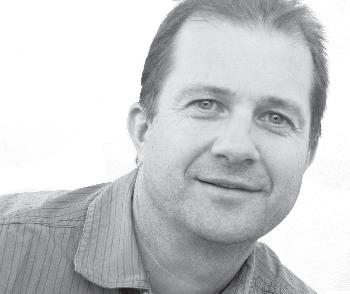
In 2003, 36 year old Doug Bruce found himself on a New York subway with absolutely no memory of his life or identity prior to that moment.
His story is captured in the 2006 documentary, Unknown White Male, as he attempts to piece together the jigsaw of his past.
Bruce is diagnosed with an extremely rare form of amnesia which typically lasts for a few hours; however, by the end of the film two years have passed and Bruce is still unable to recall any aspect of his former life.
Over the documentary’s duration we witness the birth and growth of his new identity as he is, in a sense, reborn. His “blank-slate” condition initially causes him concern but, as he has no conscious connection to his past, he gradually comes to terms with his new self and in a moment of introspection he philosophises, “Who are any of us really?” He then turns to the interviewee and asks, “Do you know who you are?”
It is a question that we should all be asking ourselves. Are we simply a conglomeration of our memories and experiences, as Bruce alludes? If this were true then there could be great benefits attached to his condition. Imagine the advantages of being able to mentally delete certain memories from our past?
Imagine what life would be like if we could erase all the painful childhood moments that have haunted us, or all the hurtful words or actions that have been inflicted upon us, or even those perpetuated by us?
What sort of person would we become if we could wipe out all traces

of shame, grief, guilt, fear or failure that have scarred and burdened us? Would such an opportunity allow us to be unshackled from all that has negatively shaped us and provide us with the freedom to start anew? I don’t believe it would. Selective memory deletion will not overcome our human weaknesses and capacity to sin.
If we perceive ourselves to be no more than products of our past, then even if we are given a second chance, we are destined to allow history to repeat itself. I suggest that this will be the fate of Doug Bruce unless he discovers that his true identity is something far more profound and indelible than the shifting sands of his human experience.
We as Christians, however, have already been provided with the opportunity to be truly set free from these shackles - but sadly it is a gift that many of us do not truly embrace or under-
stand. Too often we choose to hang onto our hurts, fears, shame and guilt rather than accepting that they have been dealt with on the cross. We deem ourselves to be unworthy of love and fail to accept the forgiveness that God has granted.
What we need to do is follow the example of St Francis of Assisi who would often cry out to God, “Lord, who am I?”
It is a line of questioning that may on the surface appear similar to that of Doug Bruce’s but, in essence, they are polar opposites. St Francis was aware that his true identity could only be found in Christ and his plea to God was for a deeper revelation of that truth.
He, unlike Bruce, understood that if he did not accept that God had already granted him freedom from his own sinful human nature, then he was destined to remain imprisoned by it.
 By Fr John Flader
By Fr John Flader
When I was growing up, all Catholic families had a Bible at home but noone seemed to read it. Today I sense a much greater interest in reading the Bible among Catholics. Can you explain what has happened and why?
I too had the experience of growing up in a Catholic family where we had a Bible at home – a big one, if I remember correctly – but I for one never read it. Nor did anyone else that I was aware of. The fact that the Bible was so big and heavy certainly didn’t encourage reading it.
Many family Bibles were used to record the dates of Baptisms, first Communions and Confirmations on the special pages provided. That seemed to be their primary purpose.
The Bible, placed in a prominent place at home, was one of the identifying badges of Catholic families, like a crucifix or an image of Our Lady or the Sacred Heart. We really didn’t need to read it.
It was just there to remind us and visitors that we were Catholics.
The mindset I have just described, facetiously to be sure, was a reality for many Catholics over a period of cen-
turies. That attitude undoubtedly owes much to the Protestant Reformers of the sixteenth century.
In rejecting both the Church – which they thought had become corrupt, and in some ways it had – and its living Tradition down the ages, they fell back on the Bible as the only source of understanding what God wanted of man.
This is the principle of sola scriptura: that Scripture alone is the source of Faith and of divine Revelation.
We Catholics of course know that Scripture on its own is not sufficient. After all, as I wrote in my last column, it was the living Tradition of the Church that gave us the Bible in the first place.
And it is the teaching authority of the Church, with the guidance of the Holy Spirit, that interprets the Scriptures for us authentically.
When people attempt to interpret the Bible on their own, they finish up in endless controversies about its meaning.
That is undoubtedly one of the reasons why there are now tens of thousands of Christian denominations all claiming to base their beliefs on the same Bible!
As a reaction to the errors of the sixteenth century Reformers, Catholics were encouraged to follow the teachings of the Church, which would interpret the Bible for them and teach them what God wanted them to know.
As a result, the direct reading of the Bible by the faithful over the next four centuries was not encouraged, in spite of the fact that the printing press made Bibles readily available.
Nonetheless, Catholics were still very familiar with the Bible through the readings in Mass every Sunday, where
passages from both the Old and the New Testaments were read and commented on in the homily, or the sermon, as it was more commonly called then.
At the same time, children learned the most important Bible stories in class or from their parents.
The Second Vatican Council, held in Rome from 1962 to 1965, brought about a dramatic change in the attitude to Bible reading by the lay faithful.
The final chapter of the Dogmatic Constitution on Divine Revelation Dei verbum positively encouraged the reading of Scripture:
“Likewise, the sacred Synod forcefully and specifically exhorts all the Christian faithful … to learn ‘the surpassing knowledge of Jesus Christ’” (Phil 3:8) by frequent reading of the divine Scriptures.
“Ignorance of the Scriptures is ignorance of Christ” (St Jerome, Comm in Isaias, Prol) … So may it come about that, by the reading and study of the sacred books ‘the Word of God may speed on and triumph’ (2 Th 3:1) and the treasure of Revelation entrusted to the Church may more and more fill the hearts of men” (Dei verbum, 25-26).
Today, there is an ever increasing number of Catholic Bible study groups, of lay people taking courses on Scripture in adult education programmes and of personal reading of Scripture.
It would be good if every Catholic read at least a few minutes of the Bible every day, especially the New Testament. It would be a great blessing for them, for the Church, and for society.
is the director of the Catholic Adult Education Centre in Sydney
There can be no excuses at all
As Pope Benedict met with Irish Bishops this week and prepared to issue an unprecedented papal pastoral letter, Perth writer Dr Andrew Kania reflected on the nature of the crisis
On 26 November 2009 a statement was issued by the Irish Government with regard to the findings of the Commission of Investigation Report into the Catholic Archdiocese of Dublin.
The long-awaited statement informed the Irish public that a “systemic, calculated perversion of power and trust was visited on helpless and innocent children in the Archdiocese over a 30 year period.
“The report leaves us in no doubt that clerical child sexual abuse was tolerated and covered up by the Archdiocese of Dublin and other Church authorities,” it said.
“The focus of those authorities was on the avoidance of scandal for the Church and the preservation of the good name, status and assets of the institution, rather than on the welfare of children. The findings are shocking and raise the most fundamental questions for the Church authorities.”
One of the most striking lessons that can be learned from the findings of the Commission is that a respect and a commitment to the Church by the laity should not at any stage preclude the laity from being critical of the leadership and the organisations that operate under Her name.
In fact, the Orthodox theologian, John Meyendorff, writes in words as applicable to Catholics as to the Orthodox, that: “Since the Church is catholic in all her parts, each one of her members –not only the clergy but also each layman – is called to confess and to defend the truth of tradition; opposing even the Bishops should they fall into heresy”.
It is clear that those clerics who abused children under their care,did so on the basis that the perceived general behaviour of priests was in the eyes of the Catholic laity accepted as being beyond reproach; a case of blind faith issuing carte blanche to the clerics.
Similarly, it would also appear that the hierarchs who covered up the criminal behaviour of pedophile priests did so on the basis that their authority would be accepted without question. A venomous concoction to say the least, and too irresistible in its taste and odour for the predator and opportunist alike not to drink of it.
As early as the fourth century St Jerome (347 – 420) declared that Bishops and clerics can sometimes be persons of poor character. He warned: “Do not let your deeds thwart your words. Otherwise, when you are speaking in church, your hearers will tacitly retort, ‘Why do you not put your own words into practice?’”
St Hilary of Poitiers (300 – 367), even went so far as to say that: “The ears of the faithful are holier than the hearts of the Bishops”.
Several hundred years later, the Dominican, Blessed Humbert of Romans (1200 – 1277), provided a candid look at corruption within the Church of the 13th Century when he preached:
“Others are put off by the cor-

ruption to be found in the rulers of the Church, who often put obstacles in the way of preaching, instead of fostering it as they ought to, like the scribes and Pharisees among the Jews and the priests of the temples among the pagans who always did their best to thwart the preaching of Christ, and even persecuted his preachers fiercely, as we can see in the Acts of the Apostles and the legends of the saints”.
“A systemic, calculated perversion of power and trust was visited on helpless and innocent children in the Archdiocese over a 30 year period ...”
That the problem of corruption in the clergy seems to be historically entrenched is also evidenced from the writings of Blessed Jordan of Saxony (1190–1237) who recounted the tale: “Once, when I was in a large city in Brabant called Brussels, a girl came to me, who was not very well off, but was good looking. She was crying and asked me to help her. I encouraged her to tell me what the matter was.
“With a lot of sobbing and sighing, she said, ‘I’m in a dreadful state. A priest tried to take me by force and kissed me against my will, and I slapped him in the face and made his nose bleed. Now the clergy all tell me there is no alternative but for me to go to Rome about it’.
“I could hardly stop myself from bursting out laughing, but I spoke to her very seriously, putting the fear of God into her as if she had committed a grave offence. Eventually, I made her swear that she would do exactly what I told her.
“Then I said, ‘By the oath you have sworn, I command you: if he or any other priest tries to force his kisses on you or to pet you, clench your fist tight and knock his eye out if you can. Whatever his rank may be, do not let him get away with it. It is quite lawful to hit anyone to preserve your chastity, as it is to defend your bodily life’. Then I encouraged the girl herself and everybody else who was there to have a good laugh and cheer up”.
An obedience to the dogma of the Church should never be hyperextended to applying a saintly veneer to the men and women who comprise Her; especially if it means that in addition to selective vision we also deafen our ears to the blaring injustice or evil that men can do.
St François de Sales is unequivocally clear on this point in the Introduction to the Devout Life when he writes: “While extremely sensitive as to the slightest approach to slander, you must also guard against an extreme into which some people fall who, in
their desire to speak evil of no one, actually uphold and speak well of vice.
“If you have to do with one who is unquestionably a slanderer, do not excuse him by calling him frank and free-spoken; do not call one who is notoriously vain, liberal and elegant; do not call dangerous levities mere simplicity; do not screen disobedience under the name of zeal; or arrogance of frankness; or evil intimacy of friendship. No, my friends, we must never, in our wish to shun slander, foster or flatter vice in others: but we must call evil evil, and sin sin, and so doing we shall serve God’s glory.”
It is not Christianity to dress the wolf in an outfit of wool and place him in a pasture among the fold – knowing that every time he shows his teeth the sheep will dimly obey; nor is it Christianity to have the wolf sit in the pasture land in the hope that by coming to be acquainted with the meekness of the lamb he will have a metanoia and become a vegetarian; nor is it Christianity for the wolf to slowly eat the sheep one by one, and then for their shepherd to rationalise this behaviour with an apologetic explaining the circle of life, or feigning ignorance as to the inherent ill-will of the wolf toward the sheep.
Every good shepherd is aware of the loss of his flock and seeks the immediate root cause; for no wolf, however cunning he is, has the ability to pull the wool over a loving shepherd’s eyes.
One cannot blame the laity of Ireland for being naïve. A loyal and faith-filled people were abused twice over – first by the sexual crimes committed; second, by the brutal rape of trust that was entwined in the depraved act.
Every father and mother who gave their child to the Church, to be purified, only to receive them back, defiled, can never be fully compensated. Christ knew this when he spoke of millstones and those who take the innocence of children from them. There can be no excuse for these crimes and no excuse for their being covered up.
The Nuremberg defence remains impotent even if dressed up in a clerical collar or if the hand that hid the crimes also held the shepherd’s crook. The cause of what occurred in Ireland is perhaps best summed up by Gerard de Groote, who in 1383 delivered a sermon to his chapter-house in Utrecht, in which he addressed the presence of moral corruption in the Church, specifically amongst the clergy. As de Groote saw the issue: “My lords, the more august the priesthood, the more scandalous the dissoluteness therein”.
When men seek to prematurely make Saints of the living by blindly assuming standards of perfection of them; oftentimes they but succeed in assisting the devil in his task of disguising himself.
We are a Church of Saints and Sinners – and the presence of either should never be forgotten.
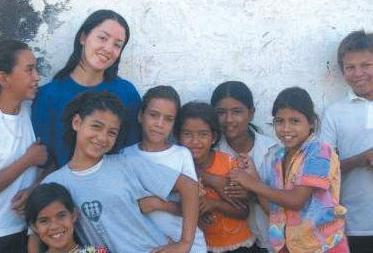 BY ANTHONY BARICH National Reporter
BY ANTHONY BARICH National Reporter
A27 year old Canberra woman is starting a scholarship for students in the slums of Paraguay to trigger a larger-scale effort to alleviate the severe poverty in the South American country.
Elizabeth Doherty, communications officer for the Australian Catholic Bishops Conference, worked as a Catholic missionary for two years teaching English, art and music in the slums of Paraguay’s capital city Asuncion in 2008-09.
While there, she befriended Mario Palacios Estigarribia, 21, who grew up in Banado Sur, one of Asuncion’s poorest neighbourhoods, in a family of eight children and was educated by the organisation Fe y Alegria, an organisation which provides education all over Latin America to children from the poorest families.
The scholarship will start with proceeds for Mario to study journalism at Asuncion’s best university Nuestra Senora de la Asuncion, also known as La Catolica, so he can raise awareness of injustice in a country where corruption is widespread.
Smuggling, organised crime and money laundering are rife in the country and, with few mineral resources, Paraguay depends heavily on agriculture.
Sixty per cent of its 6.3 million people live in poverty and it has the most unequal distribution of land in the region.
In the mid-1990s, nearly half of Paraguay’s farmers did not own land, according to the World Bank.
Later in that decade, less than 10 per cent of the population owned and controlled more than 75 per cent of the nation's land, leaving much of the large rural population landless and subsisting in extreme poverty.
Today, thousands of hopefuls from all over Paraguay come each year to sit exams in the hope that they may get a government sponsored job.
In his last attempt, Mario just missed out.
“Mario is intelligent, motivated and the only thing stopping him from studying is money,” Miss Doberty said.
“Mario lives in community with a number of friends, and they have a small sign-making business which gives them

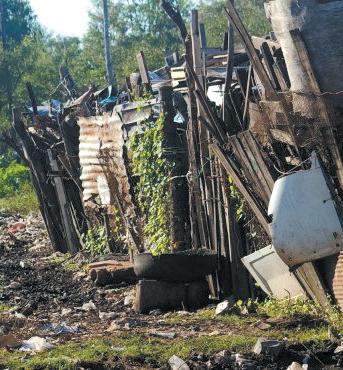
enough money for food and clothing, but not much else.”
To pay for a four-year degree at La Catolica in Communications/ Journalism will cost $6,000.
“This is prohibitively expensive for most Paraguayans, but for many Australians, it is a small cost, especially when split between many people,” Miss Doherty said. She has started www.movinghearts.org.au to sell craftworks, cards and media at a low cost. Funds raised from the sale of these items will go directly toward poverty alleviation and educational development programmes in Paraguay. People can also provide funds for Mario’s scholarship without buying goods.
“People in Paraguay often don’t get the education they deserve just because they come from a poor area,” Miss Doherty told The Record
Before working in Paraguay in 2008-09, Miss Doherty taught migrant English in Western Sydney.
A CD she produced to fundraise for the project, called Con Corazon Abierto, will be launched in Yarralumla, ACT on 26 March by social commentator Melinda Tankard Reist.
Panorama entries must be in by 12pm Monday.
Email to administration@therecord.com.au, faxed to 9227 7087, or mail to PO Box 75, Leederville WA 6902.
Events charging over $10 will be put into classifieds and charged accordingly. The Record reserves the right to decline or modify any advertisement.
MONDAY, 22 FEBRUARY
Study Course
4pm at the Resources Centre for Personal Development, Fremantle. The study will be on pastoral care, prayer and the study of relationship principles in the New Testament. Enq: 9418 1439 or 0409 405 585.
Eucharistic Celebration
5.30pm at St Catherine’s House of Hospitality, 113 Tyler Street, Tuart Hill. All invited to this Mass celebrated by Fr Gregory Carroll. Supper to follow. Cost $10. Enq: Margaret 9390 8365 or Maranatha 6380 5160.
TUESDAY, 23 FEBRUARY - THURSDAY
25 FEBRUARY
Lenten Mission
7.30 - 9.30pm at St Anthony’s Catholic Church, Dundebar Road, Wanneroo. Come and be encouraged and inspired in the most important time of the year presented by the Catholic Guy, it’s a great way to prepare for Easter. Everyone is welcome.
FRIDAY, 26 FEBRUARY
Medjugorje – Evening of Prayer
7 - 9pm at St Simon Peter Parish, Prendiville Avenue, Ocean Reef. Thanksgiving Prayer for Our Lady’s reported apparitions at Medjugorje takes place with Adoration, Rosary and Benediction concluding with Holy Mass. Free DVD on Fr Calloway’s conversion. All warmly welcomed. Enq: Eileen 9402 2480.
SATURDAY, 27 FEBRUARY
Voice of the Voiceless Ministry of Pope J Paul II
11.30am at Our Lady of the Most Blessed Sacrament Church, Corfield Street and Isdell Place, Gosnells. Private adoration of the Blessed Sacrament, 12 noon Healing Mass, with Voice of the Voiceless Music Ministry followed by fellowship at 1pm. Please bring a plate.
St Ildephonsus College - SIC New Norcia Reunion
3pm at Atrium Room, Mt Henry Tavern, Manning Road, Como. Students who attended as first years in 1946 to leaving Certificate in 1950 are invited to a 60 year reunion. Still looking for Bob Flynn, Brian Gelfi, Peter Lee, Ron McCann, Desie Mulcahy, Ray Strickland, Pat Walsh, and Noel League Blake. Enq: Berni 9924 3214, Colin 9887 1054 or Barry 9450 2232.
Novena Devotion – Our Lady of Good Health Vailankanni
5pm at Holy Trinity Church, Embleton followed by Vigil Mass at 6pm. Enq: George 9272 1379.
SATURDAY, 27 FEBRUARY - SUNDAY, 28 FEBRUARY
Prayer Weekend
8.30am at the Redemptorist Monastery, North Perth. Christ sees the urgent need for intercession and invites you to spend this Lenten weekend with Him in prayer. Come and experience the healing and saving power of Christ through the Holy Spirit and let Him renew and transform you to be His powerful intercessor like Mary His Mother. Sessions will be led by Fr Hugh Thomas CSSR. Enq: Gertrude 0411 262 221, 9455 6576 or Rose 0403 300 720.
SATURDAY, 27 FEBRUARY - THURSDAY, 4 MARCH
Retreat - Eucharist and The Word of God - For Healing Life’s Hurts and Guilt
6pm, 7.30am, 9.30am Weekend Mass and 7.30 - 9pm
Monday to Thursday at Our Lady of the Most Blessed Sacrament Church, 175 Corfield Street, Gosnells. Conducted by Fr Gilbert Carlo, Divine Word Missionary, focuses on faith, hope, love, forgiveness, personal and family prayer, Bible reflection.
FRIDAY, 5 MARCH
Pro-Life Witness
9.30am at St Brigid’s Catholic Church, Midland. Commencing with Mass, followed by Rosary procession and prayer vigil at abortion clinic, led by the Franciscan Friars of the Immaculate. Come and pray for the conversion of hearts. Enq: Helen 9402 0349.
SATURDAY, 6 MARCH
Witness for Life
8.30am at St Augustine’s Church, Gladstone Road, Rivervale. Commencing with Mass, followed by Rosary procession and prayer vigil at abortion clinic, led by Columban Missionary priest, Fr Paul Carey. Come and pray for the conversion of hearts. Enq: Helen 9402 0349.
Day with Mary
9am - 5pm at Good Shepherd Church, 44 Streich Avenue, Kelmscott. Day of prayer and instruction based on the Fatima message. 9am Video, 10.10am Holy Mass, Reconciliation, Procession of the Blessed Sacrament, Eucharistic Adoration, Sermons on Eucharist and Our Lady, Rosaries and Stations of the Cross. BYO lunch. Enq: Franciscan Sisters of the Immaculate 9250 8286.
Peace Vigil
6 - 9.30pm at the Redemptorist Monastery. Come and light a votive candle for peace, join us in praying for peace in our country and for war-torn parts of the world. An evening of prayer and reflection with a different presenter, each half hour in the presence of the Blessed Sacrament. Come for one or more sessions or stay for the evening, supper provided.
SUNDAY, 7 MARCH
Divine Mercy
1.30pm at St Francis Xavier Church, 25 Windsor Street, Perth. Divine Mercy Prayer, Reconciliation, Rosary and Fr Shamber Maria FFI will give homily on St John of God. Enq: 9457 7771.
WEDNESDAY, 10 MARCH
Chaplets of the Divine Mercy
7.30pm at St Thomas More Catholic Church, Dean Road, Bateman. A beautiful, prayerful, sung devotion accompanied by Exposition and followed by Benediction. All are welcome. Enq: George 9310 9493 home or 9325 2010 work.
FRIDAY, 12 MARCH
Seton Catholic College in Samson 20th Anniversary Celebrations
9am to 1pm at Seton College. Reunion of all ex-staff and students of Seton, De Vialar Samson, St Brendan’s Hilton and St Joseph’s Fremantle are invited. From 5pm to 9pm there will be an International Food and Cultural Festival, with food and drink on sale, archival displays and entertainment. Come and enjoy a great family night out. Enq: Sr Elizabeth-Rose Sanders 9314 1816 or www. seton.wa.edu.au.
FRIDAY, 12 MARCH - SUNDAY, 14 MARCH
God’s Farm Retreat
Fr Tony Chiera VG will lead a prayerful weekend retreat on God’s Farm, 40km south of Busselton. The topic will be Walking with the Saints, Lent 2010. For hired bus bookings, return trip Perth to Farm phone Yvonne 9343 1897. Other bookings and enquiries phone/fax, Betty Peaker sfo 9755 6212 or Mary.
SATURDAY, 13 MARCH
St Bernadette’s Catholic Primary School Fete 11am to 4pm Grand Ocean Boulevard, Port Kennedy. Rides, show bags, food, plant and cake stalls, entertainment, magician, camel rides, laser skirmish, bouncy castle and much more. Fun for all ages, come and join the fun! Enq: Alison, only if you require more information. Lacousins@aapt.net.au or 9593 6640.
St Padre Pio Day of Prayer 8.30am at Holy Spirit Parish, 2 Keaney Place, City Beach. St Padre Pio DVD, followed at 10am with Exposition of the Blessed Sacrament, Rosary, Divine Mercy, Silent Adoration and Benediction. 11am Holy Mass, celebrant Fr Tiziano Bogoni using St Padre Pio Liturgy. Confessions available. Enq: Des 6278 1540.
Divine Mercy Healing Mass
2.30pm at St Francis Xavier’s Church, Windsor Street, East Perth. Main celebrant Fr Marcellinus Meilak, OFM Reconciliation in English and Italian will be available. Divine Mercy prayers followed by veneration of First Class relic of St Faustina Kowalska. Refreshments later. Enq: John 9457 7771.
FRIDAY, 19 MARCH TO SUNDAY, 21 MARCH
Separated, Divorced, Widowed 7pm at Epiphany Retreat Centre, Rossmoyne. Beginning Experience is running a weekend programme designed to assist and support people in learning to close the door gently on a relationship that has ended, in order to get on with living. Enq: Helen 9246 5150 or Maureen 9537 1915.
TUESDAY, 23 MARCH
Open Day – La Salle College
Co-educational secondary college for Years 7-12. Tour times are 9.30am, 11.30am and 1.40pm. No bookings are necessary.
FRIDAY, 26 MARCH
Medjugorje Evening of Prayer
7 - 9pm at St Aloysius Parish, 84 Keightley Street, Shenton Park. An evening of prayer with Our Lady Queen of Peace, consisting of Adoration, Rosary, Benediction, Reconciliation concluding with Holy Mass. Free DVD on Fr Donald Calloway. All warmly welcome. Enq: Eileen 9402 2480.
MONDAY, 17 MAY - FRIDAY 28 MAY
Tour of the Holy Land
12 day tour with Fr Roy Pereira visiting Sea of Galilee, Jericho, Masada, The Dead Sea, Bethany, Jerusalem and Cana. For cost, itinerary and more details, please contact: Francis Williams (Coordinator) T: 9459 3873 M: 0404 893 877 E: francis@perthfamily.com.
GENERAL NOTICES
Perpetual Adoration
Perpetual Adoration of the Blessed Sacrament is in its seventh year at Christ the King Church, Beaconsfield. Open 24 hours, except at Mass times. All welcome. Enq: Joe 9319 1169.
Pilgrimage to the Holy Land
The Church of St Jude in Langford is seeking to put together a visit to Jordan, the Holy Land and Egypt, leaving mid-August 2010. Expect the pilgrimage to be for circa 19 days and could accommodate 28-30 people. Fr Terry Raj will be the Spiritual Director. Enq: Matt 6460 6877, mattpicc1@gmail.com
EVERY SUNDAY IN LENT
Bible Study Introduction
3 - 4 pm at St Joseph’s Parish Centre, 20 Hamilton Street, Bassendean. A Bible in hand is better than two on the shelf. Become Bible friendly. 4pm to 5pm Church History at a Glance. Appreciation of the heritage of the Catholic Faith in the Third Millennium looking at the Church’s providential pathway through history.
Extraordinary Rite Latin Mass
11am at St Joseph’s Church, 20 Hamilton Street, Bassendean.
EVERY TUESDAY IN LENT
Lenten Tuesday Prayer Meetings
7pm at St Mary’s Cathedral Parish Centre, 450 Hay Street, Perth. Join us with others in prayer for personal healing and overcoming the burdens of life united with Our Lord and Our Lady. Weekly live the heritage of the Faith in Sacred Scripture, the Holy Rosary, praise in song, and reflection. Prayer is life’s spiritual lifeline.
EVERY THURSDAY IN LENT
Catholic Questions and Answers
7 - 7.30pm at St Joseph’s Parish Centre, 20 Hamilton Street, Bassendean. Catecheses easily learned with questions and answers. Catechism of the Catholic Church, with Father John Corapi DVD series. Adult learning and deepening of the Catholic Faith from 7.30pm to 9pm.
EVERY SUNDAY
Pilgrim Mass - Shrine of the Virgin of the Revelation
2pm at Shrine, 36 Chittering Road, Bullsbrook. Commencing with Rosary followed by Benediction. Reconciliation is available before every celebration. Anointing of the Sick administered during Mass every second Sunday of the month. Pilgrimage in honour of the
Virgin of the Revelation, last Sunday of the month. Side entrance to the church and shrine open daily between 9am and 5pm. Enq: SACRI 9447 3292.
EVERY FOURTH SUNDAY OF THE MONTH
Holy Hour for Vocations to the Priesthood and Religious Life
2 - 3pm at Infant Jesus Parish, Wellington Street, Morley commencing 28 February. The hour includes Exposition of the Blessed Eucharist, silent prayer, Scripture and prayers of intercession. Come and pray together that those discerning vocation to the Priesthood or Religious Life hear clearly God’s loving call to them.
LAST MONDAY OF EVERY MONTH
Christian Spirituality Presentation
7.30 - 9.15pm at the Church Hall, behind St Swithan’s Anglican Church, 195 Lesmurdie Road, Lesmurdie. Beginning Monday, 22 February, come along and join in these informal and friendly meetings where Stephanie Woods will present The Desert Period of Christianity, 260 to 600AD. From this time period came the understanding of the Monastic Lifestyle and Contemplative Prayer. No cost. Enq: Lynne 9293 3848.
EVERY 2ND WEDNESDAY
Year of the Priest Holy Hour
7 - 8pm at Holy Spirit Catholic Church, 2 Keaney Place, City Beach. Reflections on St John Vianney, Patron Saint of Priests. Light refreshments later in the Parish Centre. Chaplets of the Divine Mercy
7.30pm at St Thomas More Catholic Church, Dean Road, Bateman. Commencing 10 February, a beautiful, prayerful, sung devotion accompanied by Exposition, and Benediction. All are welcome. Enq: George 9310 9493 home or 9325 2010 work.
EVERY 3RD WEDNESDAY OF THE MONTH
Oblates of St Benedict
2pm at St Joseph’s Convent, York Street, South Perth. Oblates affiliated with the Benedictine Abbey New Norcia welcome all who are interested in studying the rule of St Benedict and its relevance to the everyday life of today for lay people. Vespers and afternoon tea conclude meetings. Enq: Secretary 9457 2758.
EVERY THURSDAY
Group 50 Charismatic Group
7.30pm at the Redemptorist Church, 190 Vincent Street, North Perth. During these meetings messages from Lalith Pereira who gave the Four Step Retreat recently will be broadcast by satellite from Sri Lanka. The first of these will be 18 February. Other broadcasts will be on 25 February, 8 and 22 March.
EVERY FIRST THURSDAY OF THE MONTH
Taize
7.30 - 8.30pm at Our Lady of Grace Parish, 3 Kitchener Street, North Beach. Prayer and meditation using songs from Taize. We invite you to come and be still a while, listen to scripture, join in the chants from Taize, light a candle, silent prayer.
Holy Hour
11am to 12 noon Sts John and Paul Church, Pinetree Gully Road, Willetton. Please come and pray for a vocation in the parish. Enq: John 9457 7771.
FIRST FRIDAY OF THE MONTH
Communion of Reparation All Night Vigil
7pm to 1am at Corpus Christi Church, Lochee Street, Mosman Park. There will be Mass, Rosary, Confession and Adoration. Celebrant Fr.Bogoni. All warmly welcome. Enq: Vicky 0400 282 357.
Presentation - Mary in Relation to Christ’s Passion 7pm at St Peter’s Church, 93 Wood Street, Inglewood. Praise and Worship, then Reconciliation and Mass by Fr Shabel. Fellowship. Enq: Priscilla 0433 457 352 or Catherine 0433 923 083.
25
26
29
33
35

6
23 St ____ Cabrini
24 One of the Twelve
(Gn 1:26)
27 Member of a religious order
28 God’s life in us
30 Sign of office
31 “Let the dead ____ their dead…” (Lk 9:60)
32 ____ of Genesis
LAST WEEK’S SOLUTION
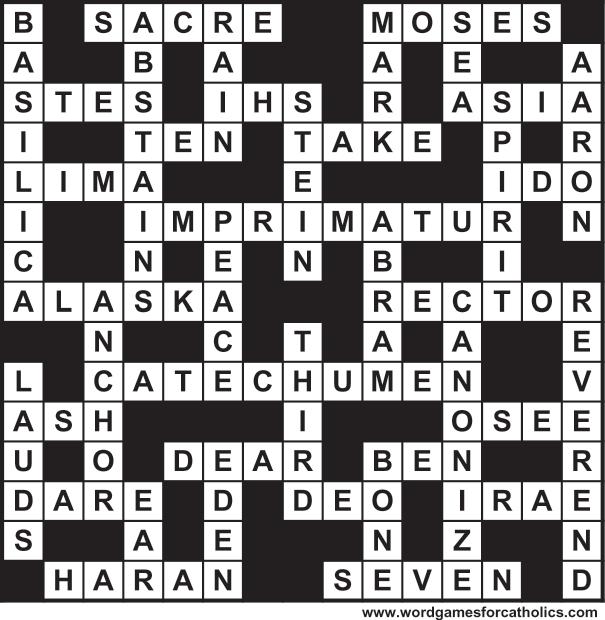

ACCOMMODATION
LARGE GOSNELLS 3 B/R UNIT
TO RENT Enclosed patio, easy care garden, large living area. Negotiable partly or fully furnished. Walk to Catholic primary and church. Commencing April $300 per week. Phone 0421 026 422.
HOLIDAY ACCOMMODATION
ESPERANCE 3 bedroom house f/ furnished. Ph: 08 9076 5083.
GUADALUPE HILL TRIGG www.beachhouseperth.com Ph: 0400 292 100.
HOUSE TO SHARE for clean living male, $120p/w Riverton. Ph: 0449 651 697.
YALLINGUP BEACH Front cottage. Three bedrooms from 2-14 March. Phone 9272 3105.
BUILDING TRADES
BRICK RE-POINTING Ph: Nigel 9242 2952.
PERROTT PAINTING Pty Ltd For all your residential, commercial painting requirements. Ph: Tom Perrott 9444 1200.
PICASSO PAINTING Top service. Ph: 0419 915 836, fax 9345 0505.
COUNSELLING
PSYCHOLOGY and PSYCHOTHERAPY www.peterwatt.com.au, Ph: 9203 5278.
FOR SALE
VIDEOS - ASSORTMENT musical, documentary, and nature, Dutch/German, 25 for $50. Phone 9277 6128
FURNITURE REMOVAL
ALL AREAS Mike Murphy Ph: 0416 226 434.
LOSE WEIGHT STAY HEALTHY Herbalife. Free support. 02 9807 5337.
Glory & Praise Songs for Christian Assembly Vol 1 and Eagle’s Wings Scripture in Song Everything I Possess, about 25 of each, more if possible. Please ring 9641 1477 or email stpatsyork@westnet. com.au to arrange pickup and payment.
PREMISES REQUIRED FOR BILLINGS LIFE WA INC We are looking for premises north of Perth where we can hold daytime clinics for our clients. We require premises, preferably with a waiting room, for a period of three to four hours during one day of the week; where we can see clients privately. A doctors’ surgery would be ideal. Similar offers would be appreciated. Our teachers are fully accredited to teach the Billings Ovulation Method of Natural Fertility Management and are experienced in Fertility Education. Please contact billings LIFE WA Inc: Marilena Scarfe: 0409 119 532.
SETTLEMENTS
ARE YOU BUYING OR SELLING
REAL ESTATE OR A BUSINESS?
Why not ask Excel Settlements for a quote for your settlement. We offer reasonable fees, excellent service and no hidden costs. Ring Excel on 9481 4499 for a quote. Check our website on www. excelsettlements.com.
RELIGIOUS PRODUCTS
CATHOLICS CORNER Retailer of Catholic products specialising in gifts, cards and apparel for Baptism, Communion and Confirmation. Ph: 9456 1777.
Shop 12, 64-66 Bannister Road, Canning Vale. Open Mon-Sat.
OTTIMO Convenient city location for books, cds/dvds, cards, candles, statues, Bibles, medals and much more. Shop 108, Trinity Arcade (Terrace level), 671 Hay Street, Perth. Ph: 9322 4520. MonFri 9am-6pm.
RICH HARVEST YOUR
CHRISTIAN SHOP Looking for Bibles, CDs, books, cards, gifts, statues, Baptism/Communion apparel, religious vestments, etc? Visit us at 39 Hulme Court (off McCoy St), Myaree, Ph: 9329 9889 (after 10.30am Mon to Sat). We are here to serve.
KINLAR VESTMENTS
Quality hand-made and decorated vestments: Albs, Stoles, Chasubles, altar linen, banners etc. 12 Favenc Way, Padbury. By appointment only. Ph: Vicki 9402 1318 or 0409 114 093.
NOVENA PRAYER
Holy St Jude Apostle, martyr near kinsman of Jesus. Faithful intercessor of those who invoke your patronage I humbly beg your assistance with my petition I promise to make your name known. Say three Our Fathers, Hail Marys and Glory be. St Jude, Pray for us who seek your aid. Amen - Ros Reddin
21
Ps 118:1-2.4-5.7-8
ON Monday evening of 8 February a severe storm developed around the city of Kalgoorlie. During the storm, at approximately 7.30 pm, a bolt of lightning struck the top of the front of the church and destroyed one of the building’s four crosses that are made of bricks and mortar.
The force of the lightning flung large pieces of material across the car park of the church and also across the building’s roof which put some holes in its shingled roof.
Luckily, the church was unoccupied at the time and no vehicles were in the car park.
With the debris now having been cleaned up, and the holes in the roof being temporary fixed, Masses should continue as normal. Built in 1903, St Mary’s Church in Kalgoorlie is a heritage listed building and also insured. It may take some months to repair.
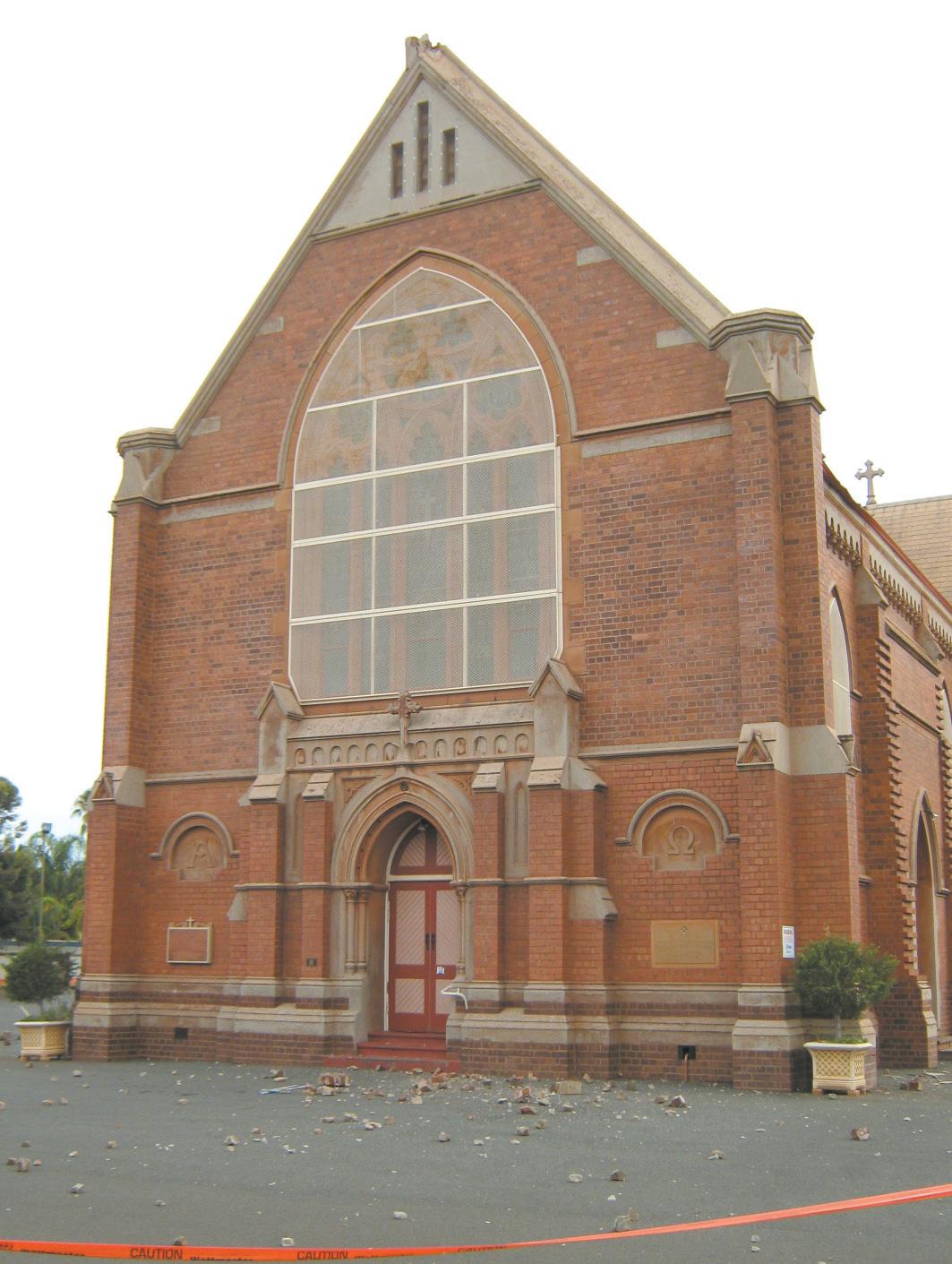
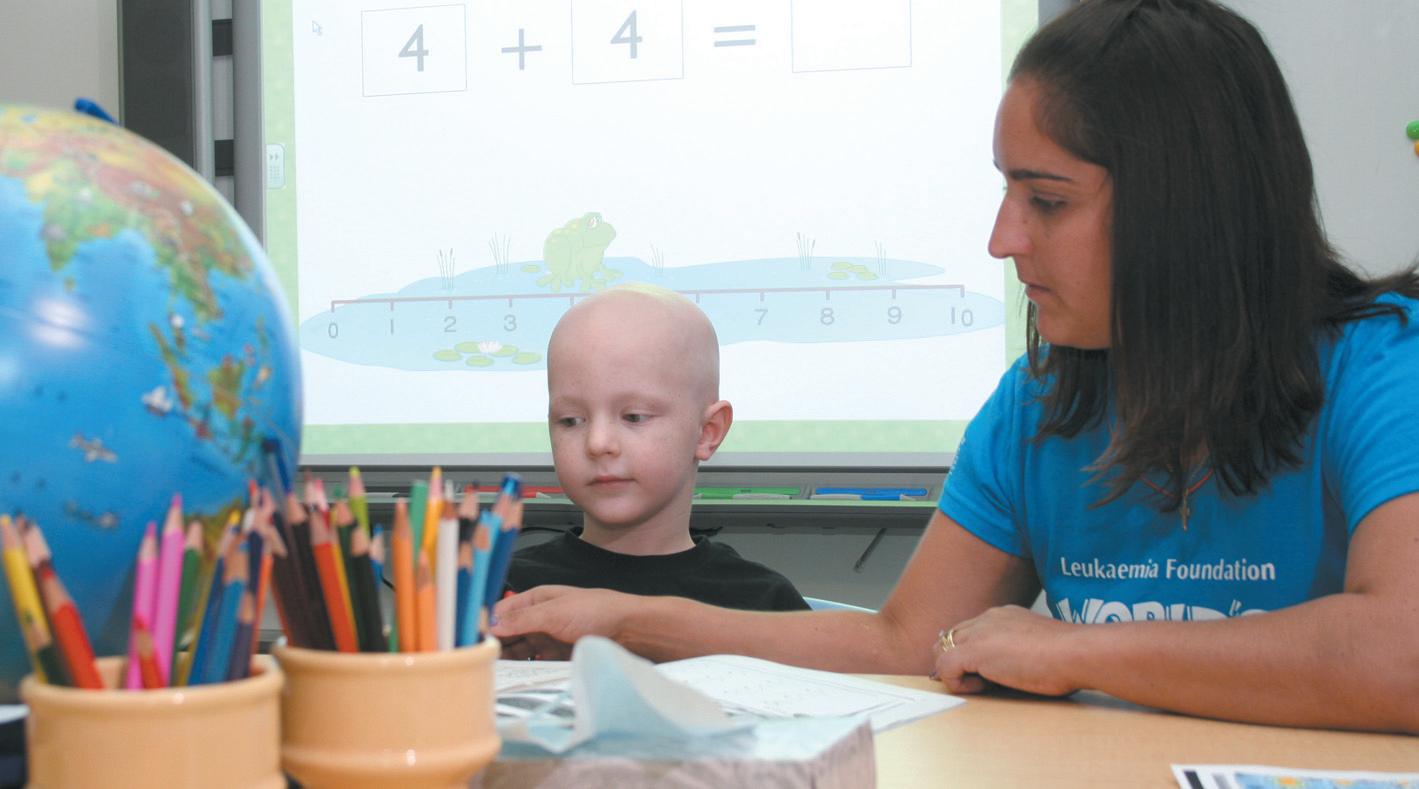
for the Leukaemia Foundation
She has put “a bounty on her hair” with the highest bidder winning the chance to shave her head.
With her young son, Ethan, spending much of his life at PMH for chronic asthma, Mrs Andrzejczak identified with the many families she met going through treatment for acute lymphoblastic leukaemia, the most common form of children’s cancer.
Her husband Michael’s grandfather had also died of leukaemia. Rachel and her husband wish that he could have known his grandchildren.
“I participated in Shave before but still feel I haven’t done enough to support this fantastic organisation,” Mrs Andrzejczak said.
“That’s why I’m pulling out all stops for this year’s World’s Greatest Shave.”
To donate or to “go brave and shave” visit the World’s Greatest Shave website at www.worldsgreatestshave.com or call 1800 500 088.
PLENTY of parents are reaching out for help when it comes to talking to teens about sex, says sexual health and relationships educator Tina Jack.
Stepping up to meet the need, her organisation, Loving for Life WA, has announced that it is holding a free Sexuality and Relationships Seminar on Thursday, 25 February.
A veteran of 12 years in the field, giving talks in high schools throughout Perth, Ms Jack says the event will give parents insight into the reality of young people's lives, the influence of news media and their peers.
Giving tips and practical guidance, the seminar is aimed at continuing Loving for Life's support for parents as the primary educators of their children, especially in the area of healthy relationships.
The organisation has a team of 18 men and women of varying ages and backgrounds who deliver seminars to Catholic high school students throughout the year.
They provide age-targetted programmes which start by asking students what they want while providing important information about relationships and emotional well-being, not just the practicalities of sexual intercouse.
In what would be surprising for some, Ms Jack says, the students paint a picture of their deepest innermost desires that very
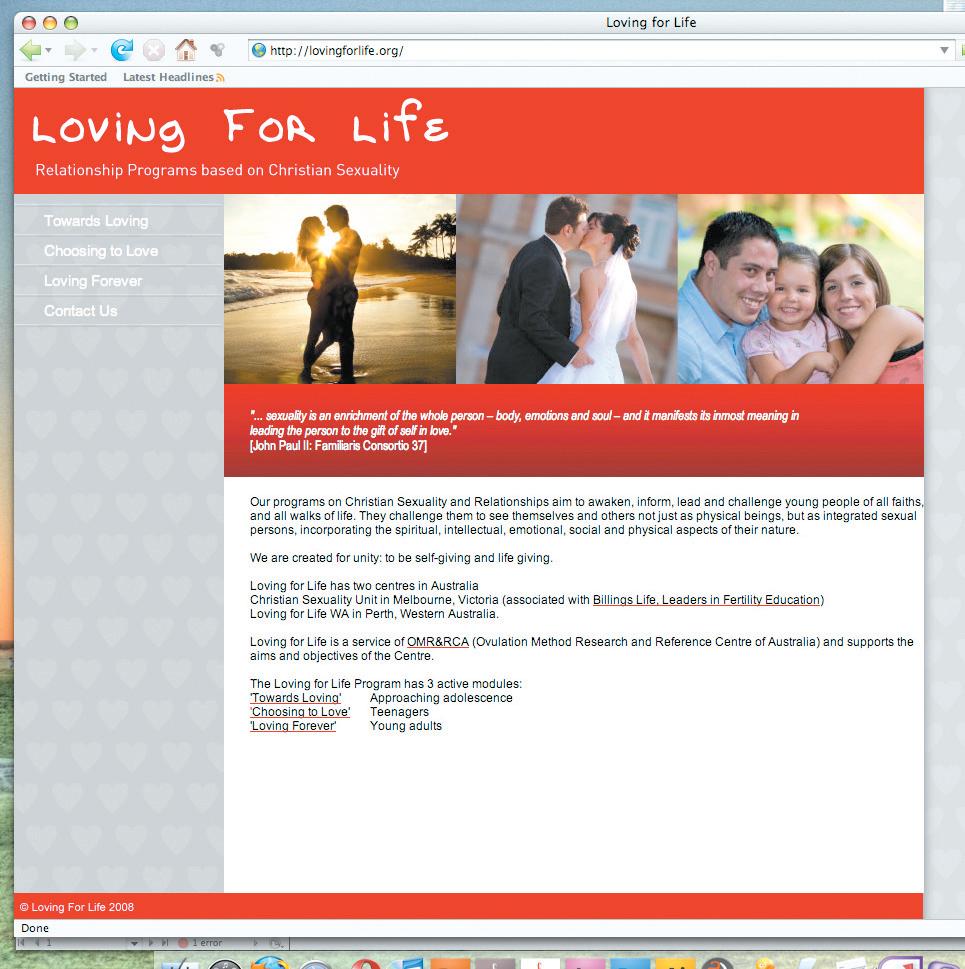
The Loving for Life website details the components of the organisation’s three programmes in relationship and sex education.
closely resembles a robust and healthy married life.
"The answers the students give show that they still have a dream for a life long committed faithful relationship," Ms Jack said.
Loving for Life conduct programmes for Year 7 students (Toward Loving), Years 9-10 (Choosing to Love) and Years 11-12 (Loving Today).
More information about the upcoming seminar and Loving for Life's student programmes can be obtained by phoning 0419 945 277 or at www.lovingforlife.org.au.
FOR three nights in early February the Church of Sts Peter and Paul in North Perth resounded with an enthusiastic crowd praying and singing their hearts out.
For the first time in WA, the Risen Lord Community from Sri Lanka conducted a retreat onsite from 2 - 4 February.
A crowd of around 170 people turned out each night to pray with the 15 person retreat team led by speaker Lalith Perera, including musicians and an intercessory prayer team.
In Sri Lanka, tens of thousands of people attend prayer meetings conducted by this group every week. The group aims to revive the Catholic Church, bringing about new life in Christ and reports countless conversions and healings as well as the mending of broken marriages and the breaking of addictions.
The retreat covered "The Love of God" and "Being truthful to ourselves, to others and to God" in its first two nights, with the final night exploring how to surrender to God and to receive His Holy Spirit.
The Sacrament of Confession (Reconciliation) was made available by three North Perth Redemptorist priests and two Sri Lankan priests on the retreat's second night.
One of the priests at the retreat told The
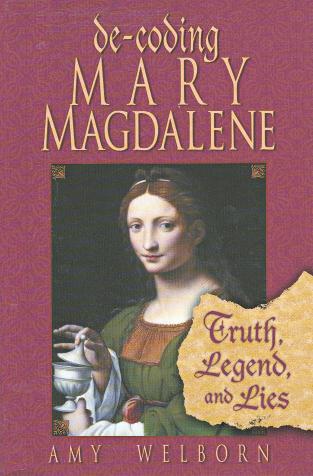

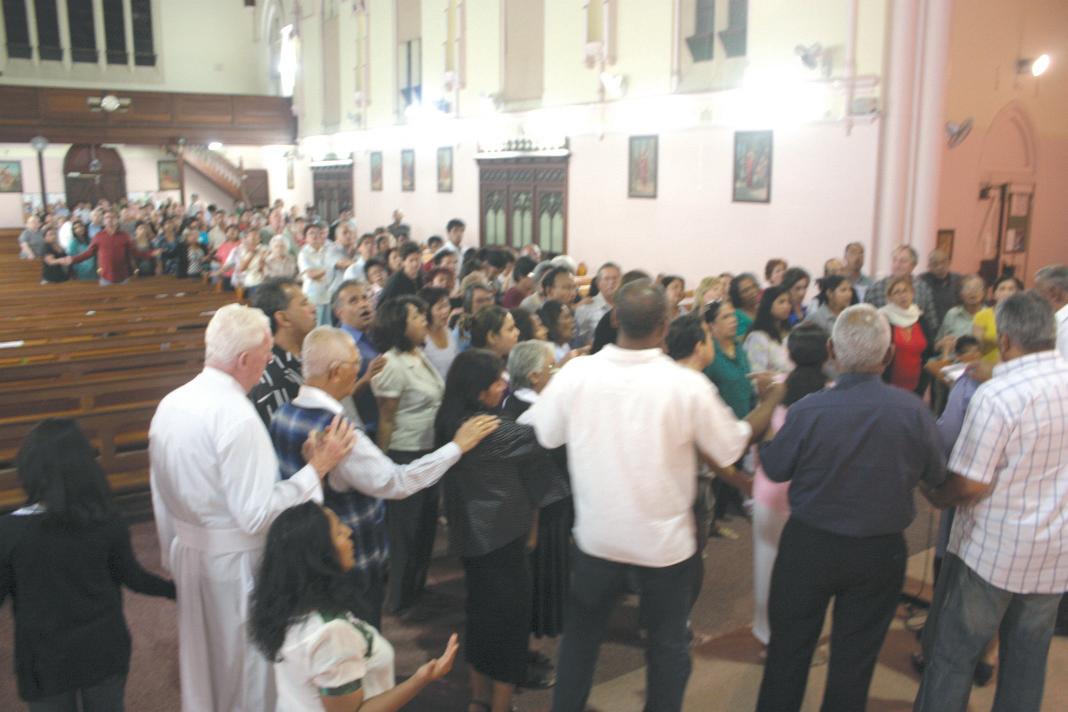
Record that the event was a great hit with all fellow attendees.
"There was a sense that many of them wanted more but it could not be as the Sri Lankan group had to rush away to catch a midnight flight to Melbourne where further labours awaited them."
Local organisers invited attendees to continue their spiritual journey at the weekly Group 50 Charismatic Group which meets at the North Perth Monastery every Thursday evening, announcing that retreat leader, Lalith Perera would continue his teaching there every second week via satellite. He will deliver his first teaching on Thursday, 18 February.
For more information on the Risen Lord Community see www. risenlordcommunity.org or www.risenlordcommunity.com
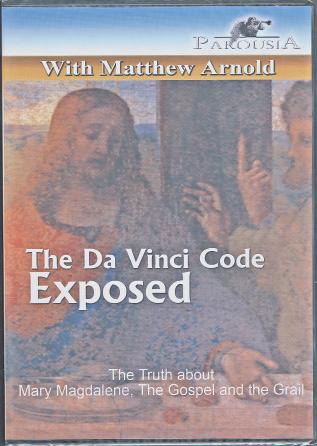



Name: